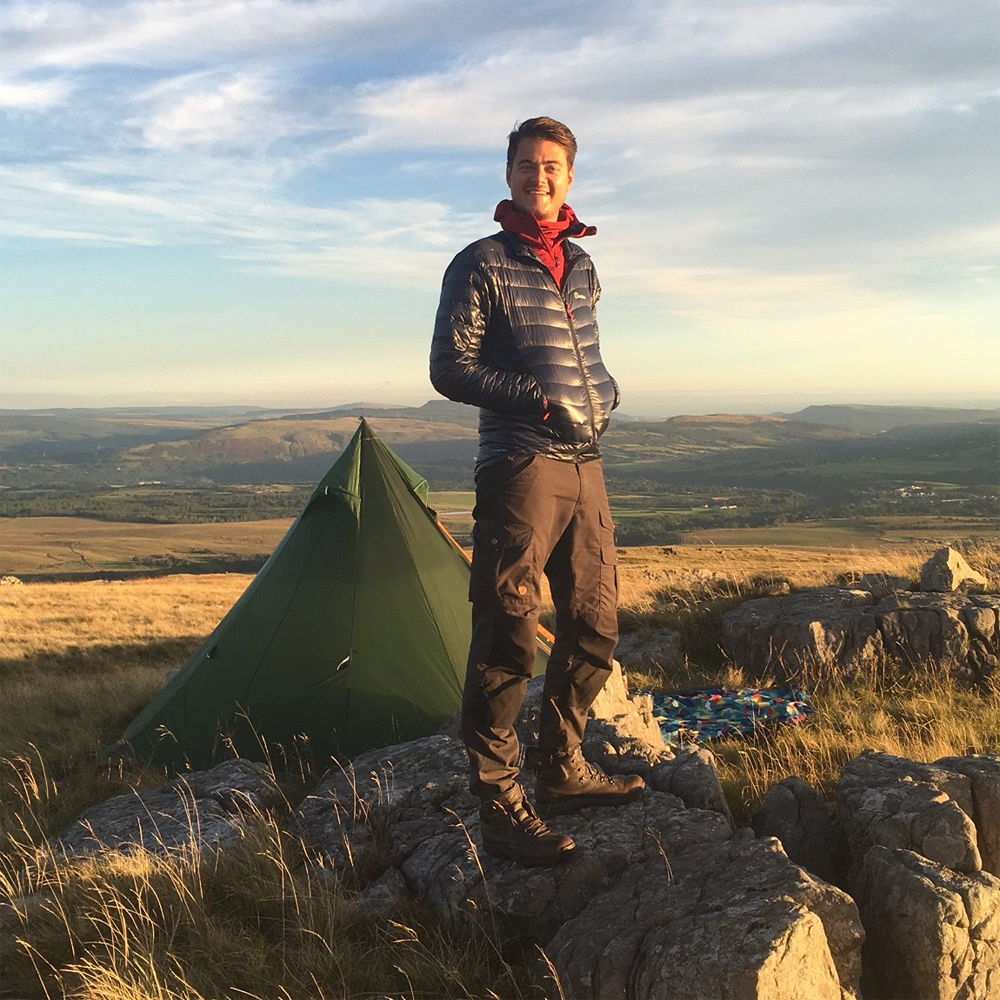The best 2-person tents 2025: built for the wilderness with minimal bulk, whether you're backpacking or car camping
Our selection of the best 2-person tents are highly portable and give reliable shelter for your backcountry expeditions
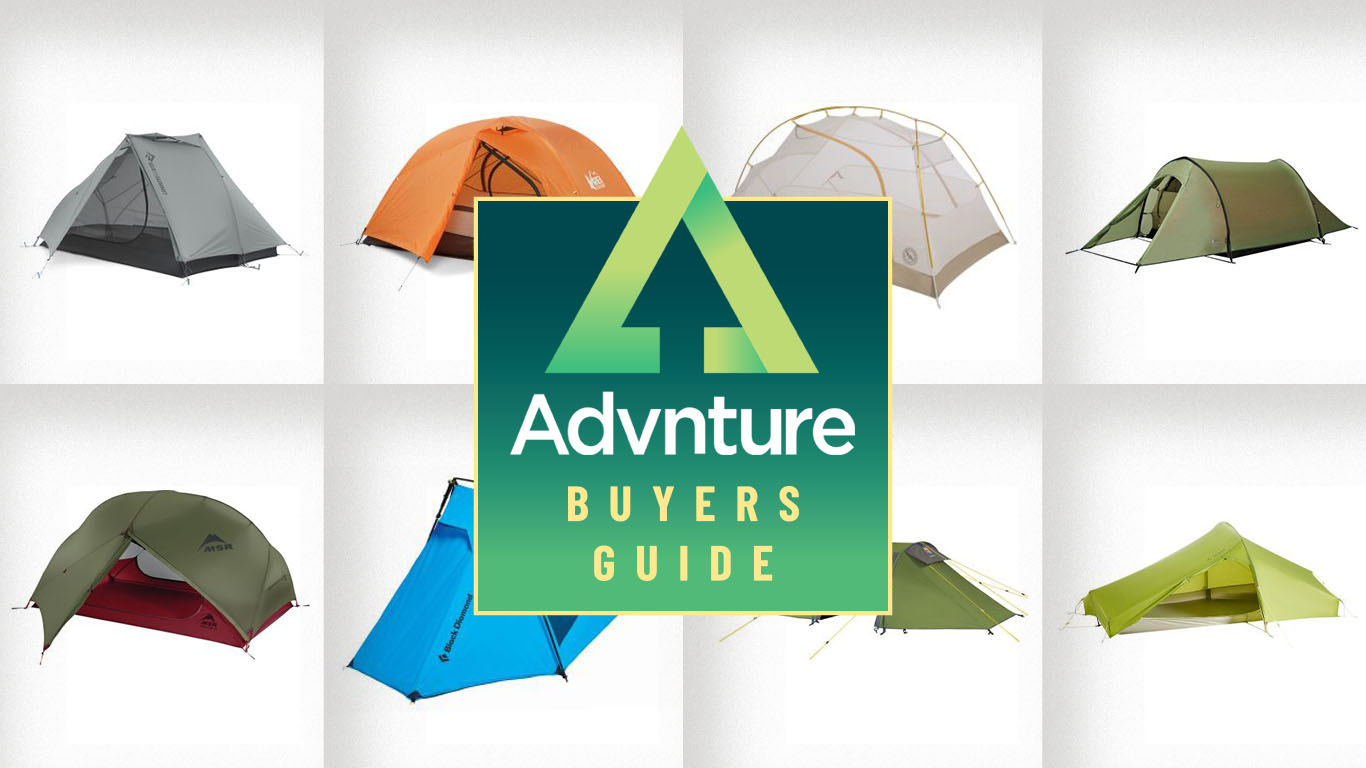
- Quick list
- Comparison table
- Best overall
- Best budget
- Best for storage options
- Best lightweight two-person tent
- Best for space
- Best for easy pitching
- Best for backpacking value
- Best for porch space
- Best for all-in-one-pitching
- Best for fast pitching
- Best winter tent
- Best windproofing
- Best waterproofing
- How we test
- Meet the testers
- How to choose
- FAQs
All the latest inspiration, tips and guides to help you plan your next Advnture!
You are now subscribed
Your newsletter sign-up was successful
When it comes to the best 2-person tents, versatility is the word. Get a quality shelter and you've got a ticket to both spectacular wilderness experiences and cozy weekends at the campsite. Even families can make use of 2-person tents – they make great separate sleeping units or extra storage for gear, as do the best one-person tents and the best pop-up tents.
The best 2-person tent is probably the shelter you'll get the most use out of, making it a worthy investment. With this in mind, it's worth taking the time to select the right tent for your planned adventures – you want a durable shelter that will last for many years and provide countless cherished memories.
In this guide, we present the best 2-person tents, tested by our experts in the backcountry. Every featured shelter is well suited to backpacking, though they're all a great shout for car camping trips, too.
Of course, if you prefer a roomier refuge, try one of the best 4-person tents. And never leave home without one of the best sleeping bags.
The quick list
This is our quick list, a brief overview of the very best two-person tents available now. For a deeper dive into each product, navigate to the more detailed reviews further down the page on this guide.
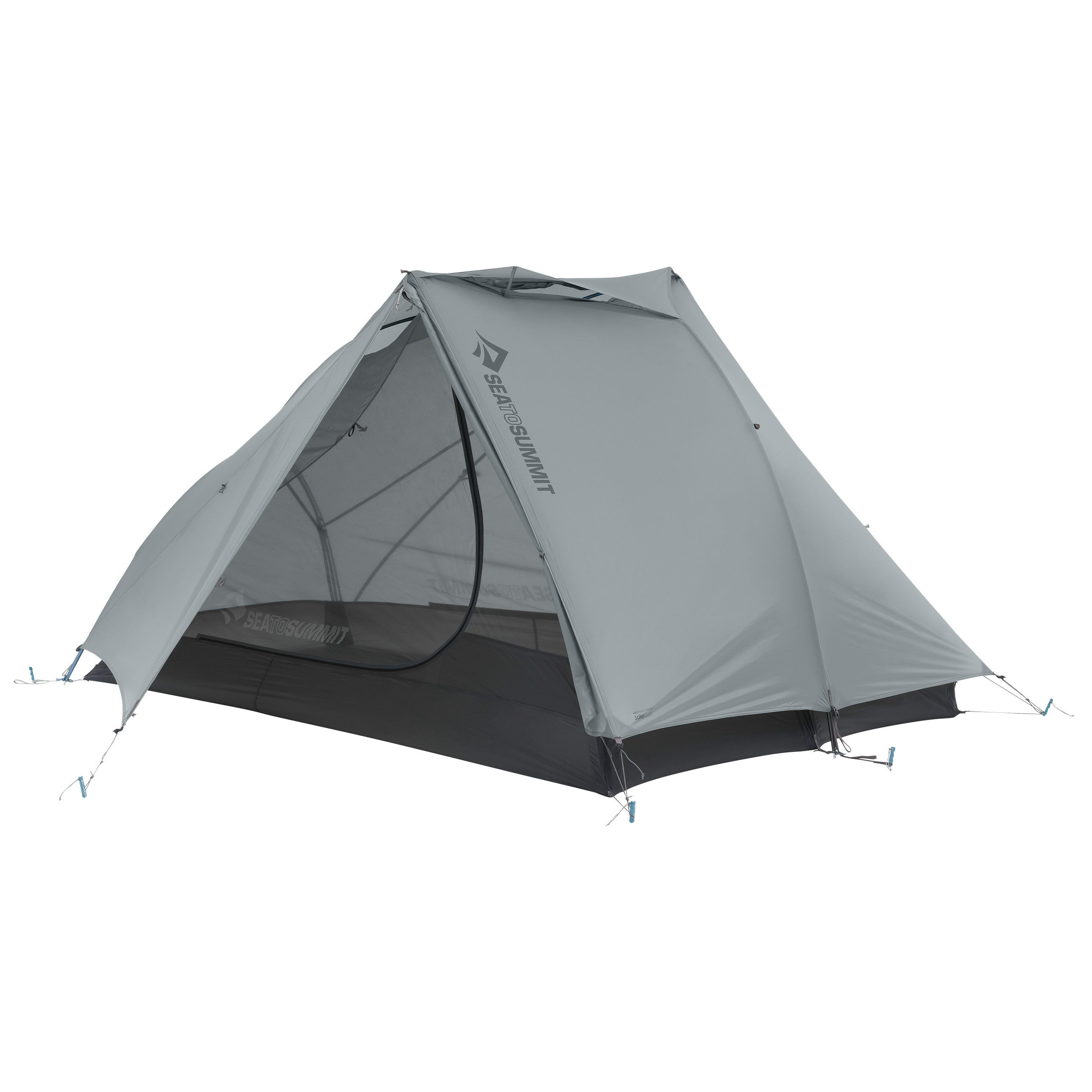
A first-class three-season shelter with an innovative semi-freestanding design and quality ultralight components throughout
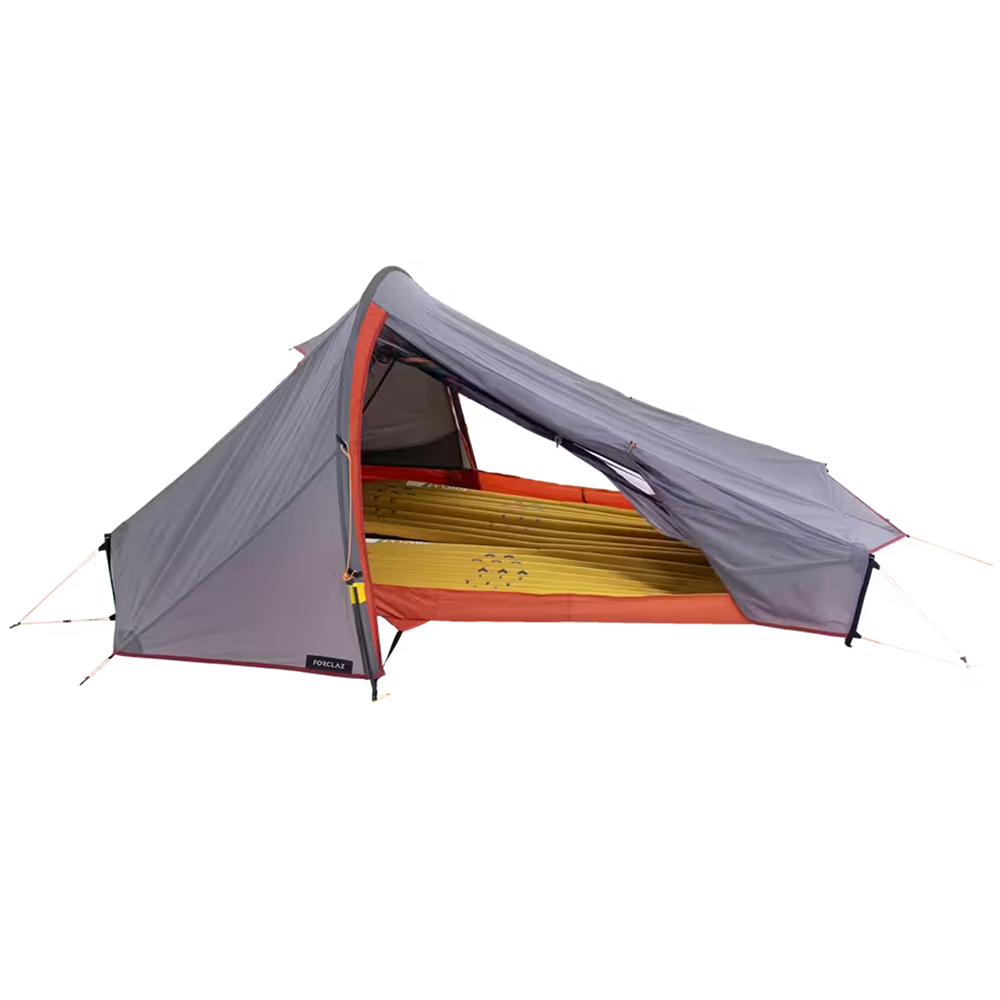
Lightweight, tiny and brilliantly weatherproof, the Decathlon Forclaz MT900 Tunnel Tent punches well above its weight and offers great value for money
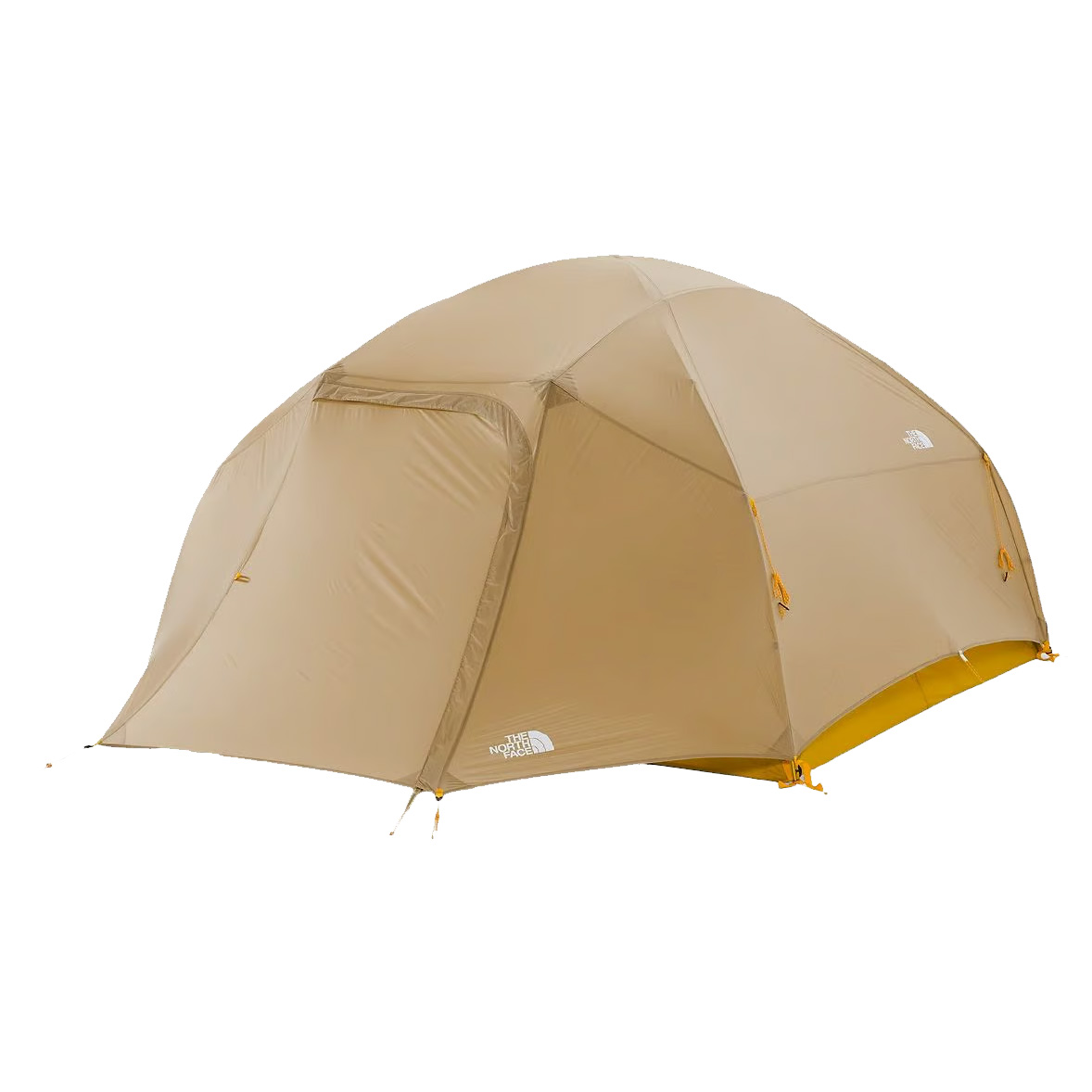
Lightweight, easy-to-carry and decidedly easy to pitch, the North Face Trail Lite 2 is a comfortable two-person, three-season shelter for use in a range of conditions
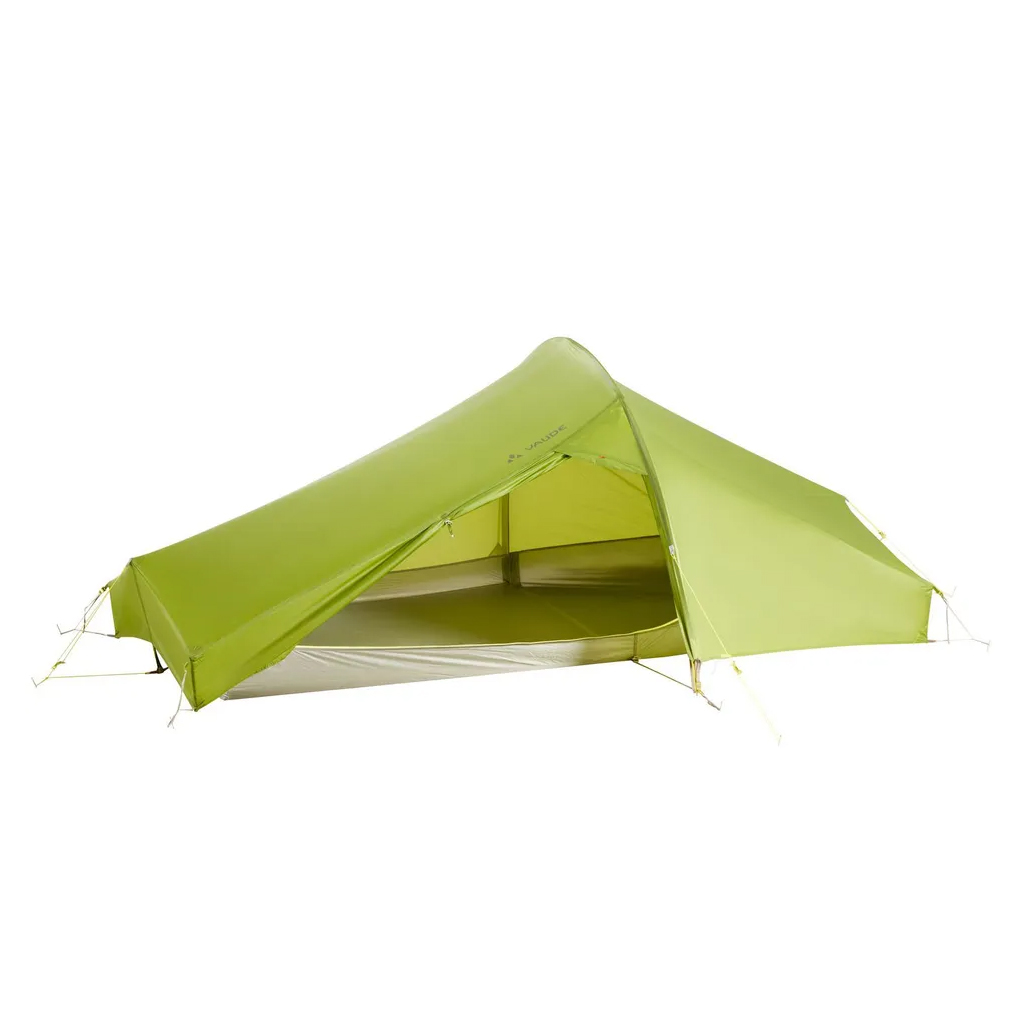
An extremely lightweight and technically advanced tent for fast adventure races or mountain missions
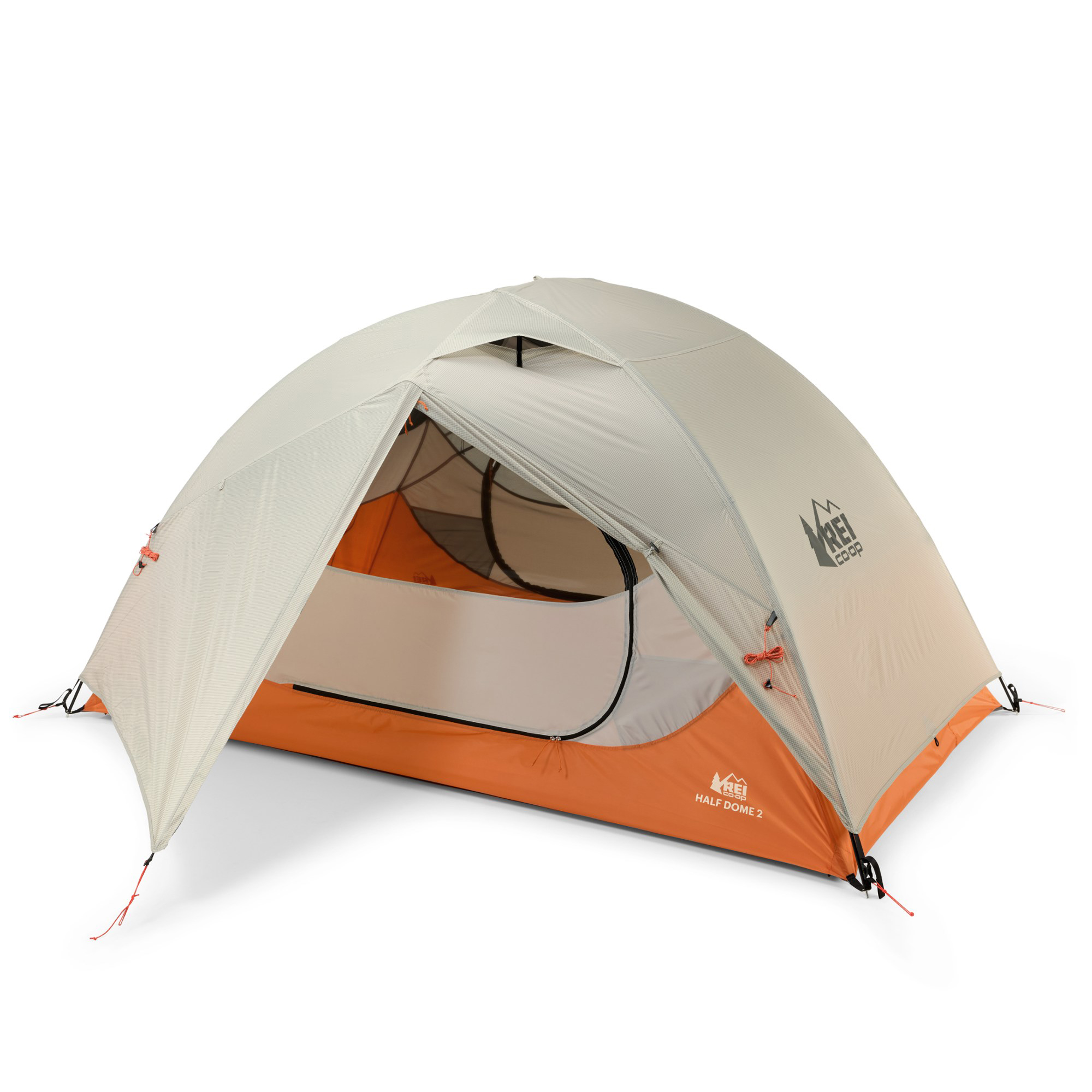
A luxurious tent for two, with a thoughtfully designed interior, environmentally friendly solution dye and quality components
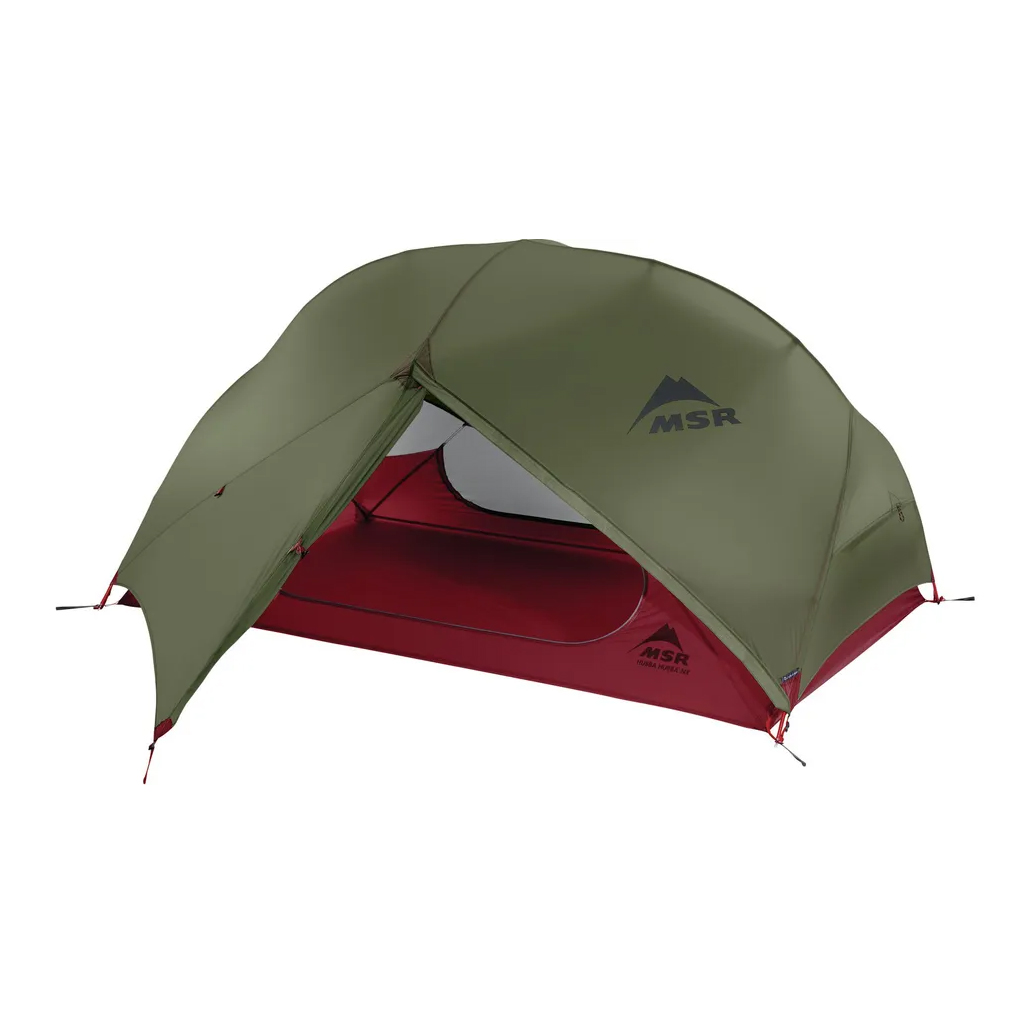
The Hubba Hubba is a roomy, ultralight and packable tent that pots up in no time, perfect for backcountry adventures
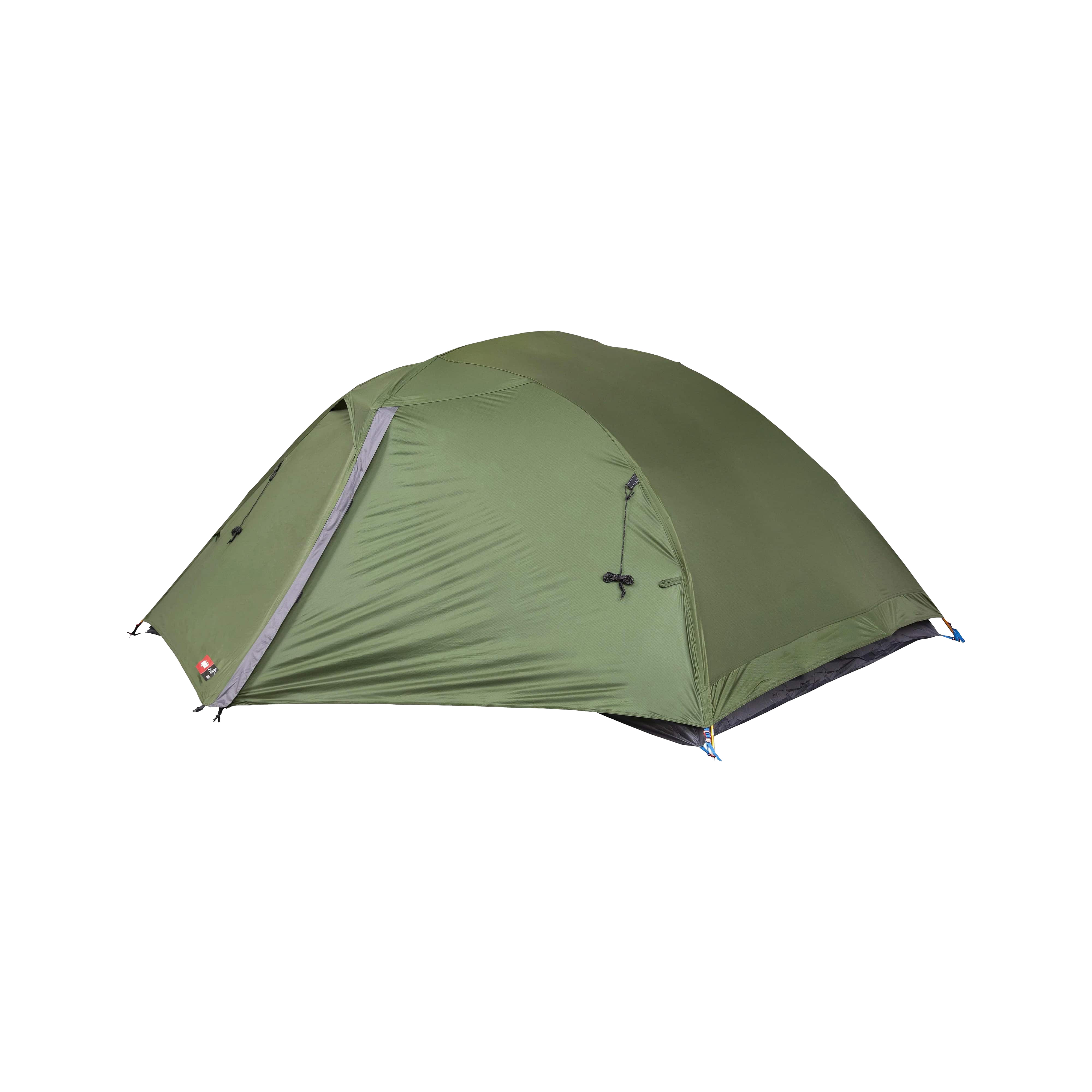
A comfortable tent with two porches and plenty of living space that's also versatile enough to use on long backpacking trips
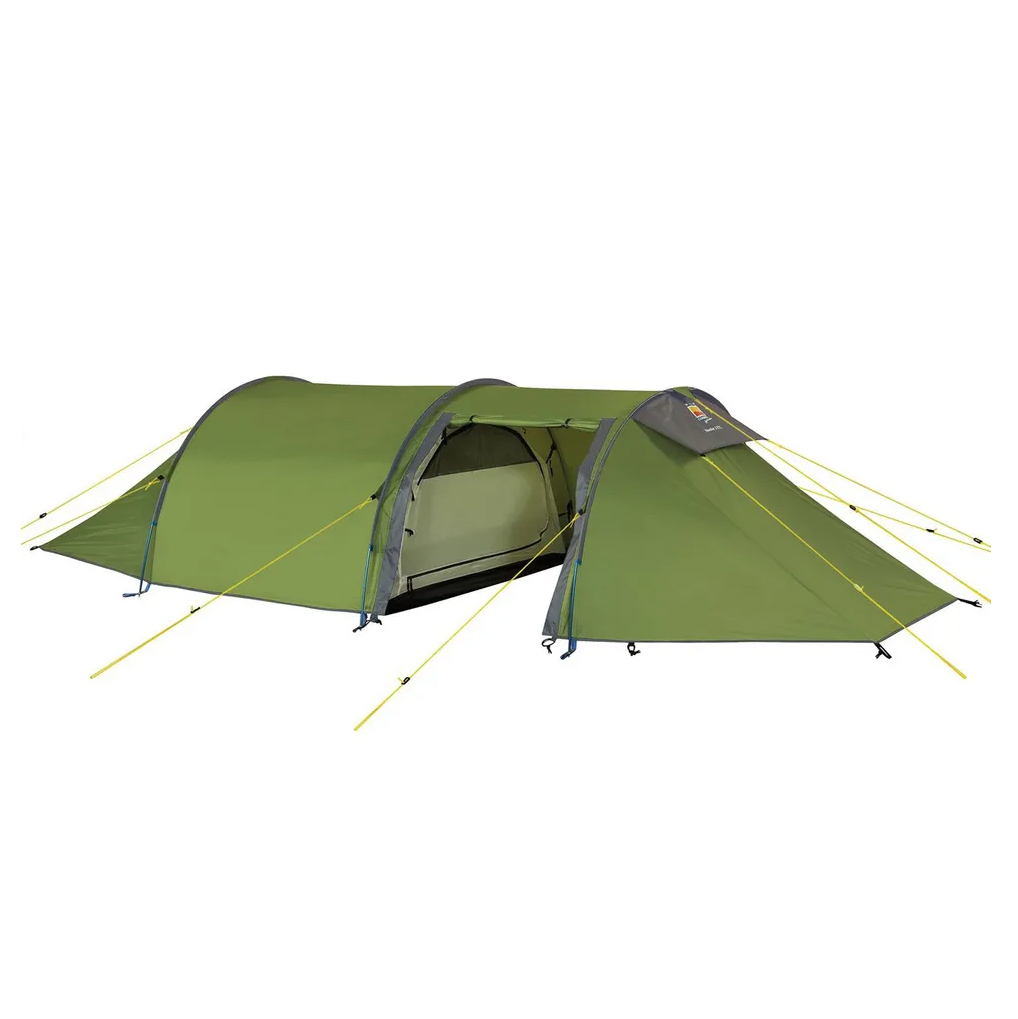
A palatial porch makes this tent a popular choice for those carrying bulky kit and for extended stays in one place. It also represents great value
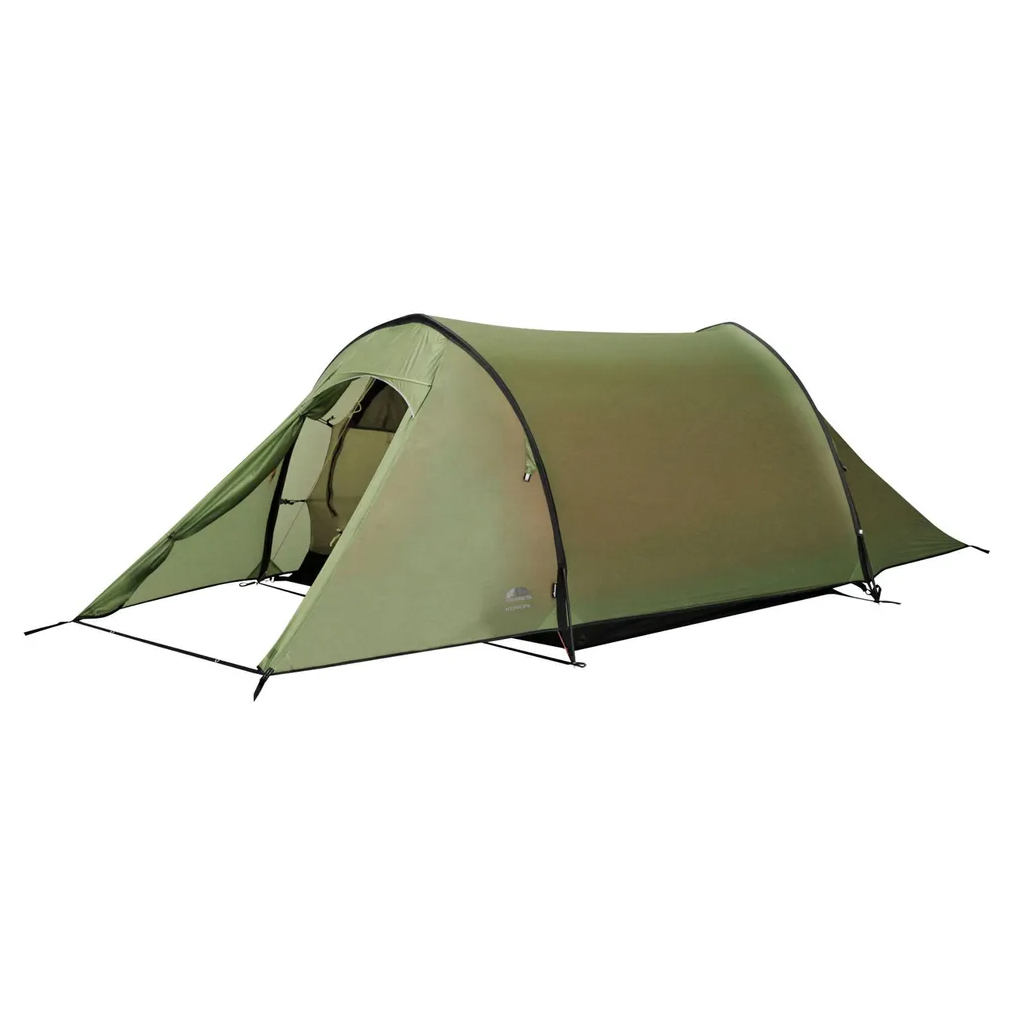
A sturdy tunnel tent that offers both performance, with good wind resistance and practicality, in that it offers plenty of headroom and pitches all-in-one
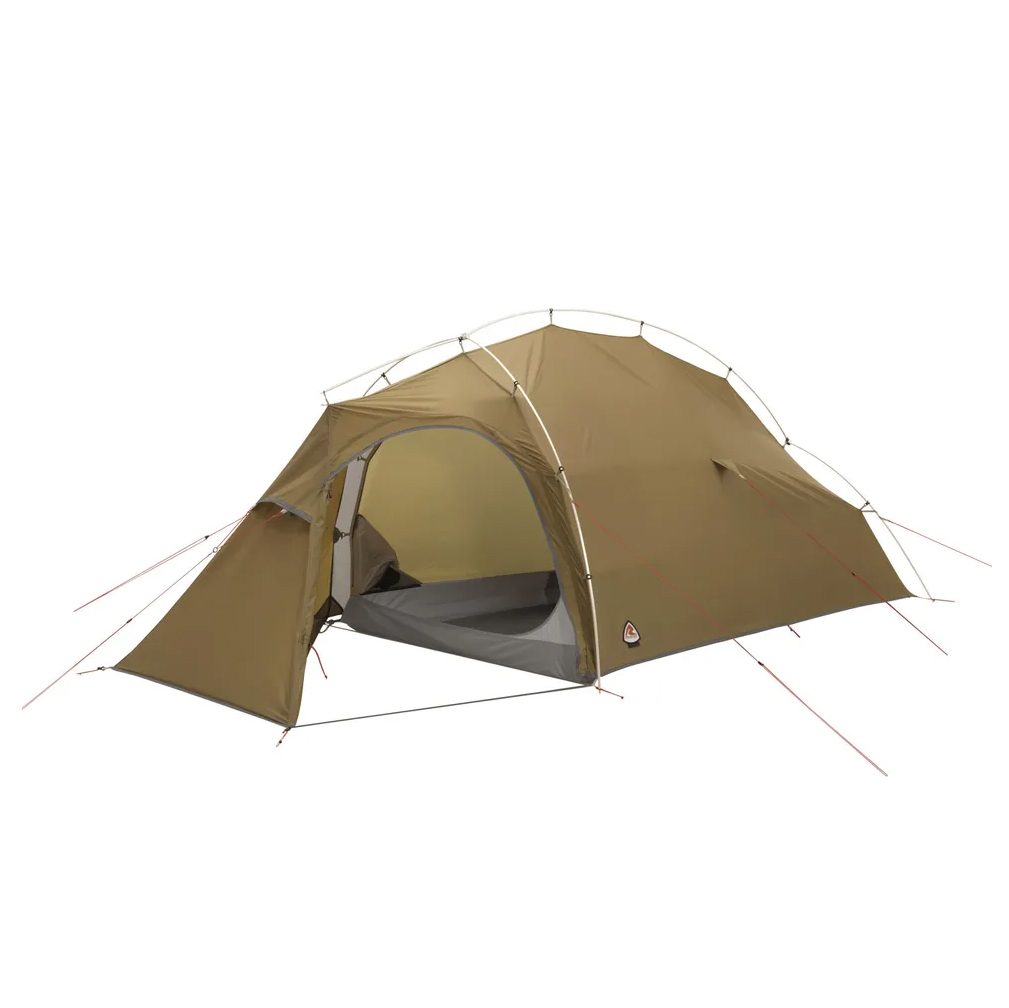
A practical, great value and thoughtfully designed tent that pitches all-in-one and stands out in the crowd
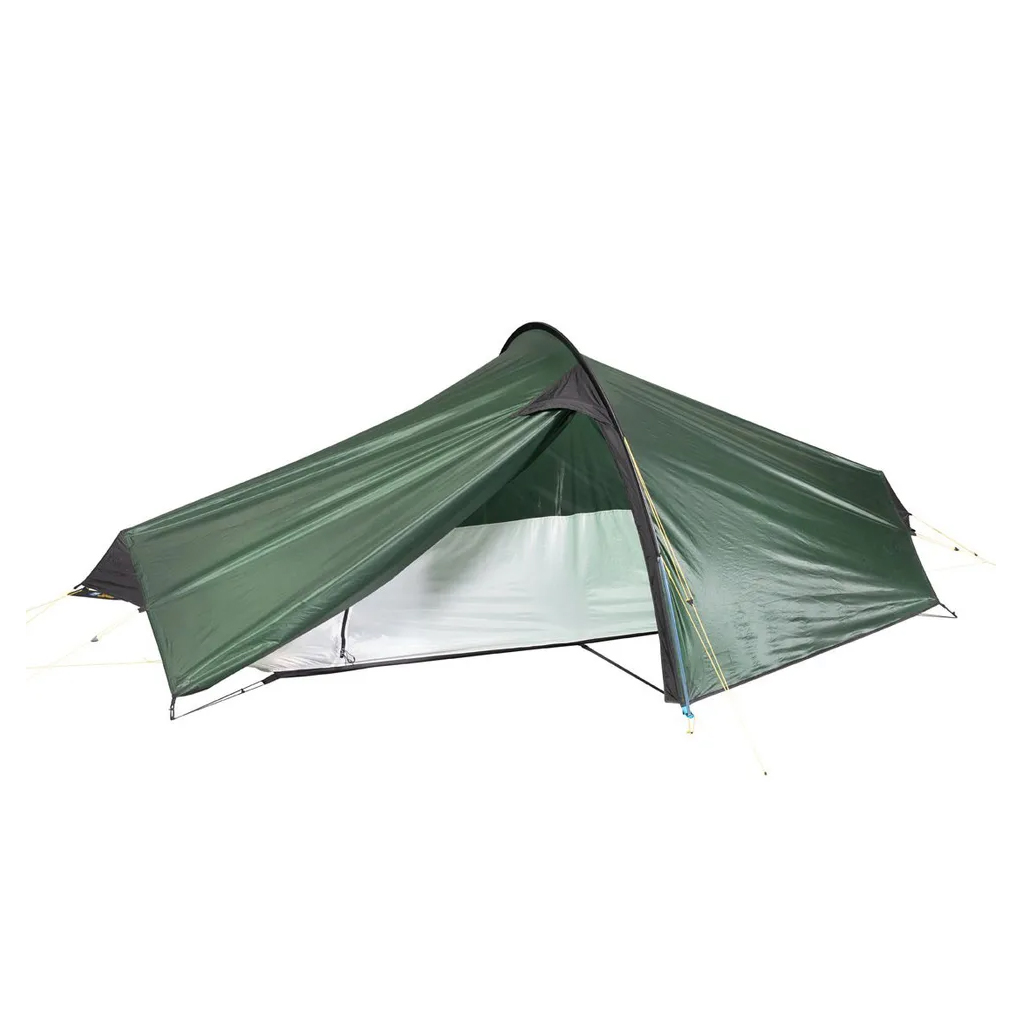
A four-season shelter with a tough design and robust fabrics, yet is lightweight and packable enough for backpacking
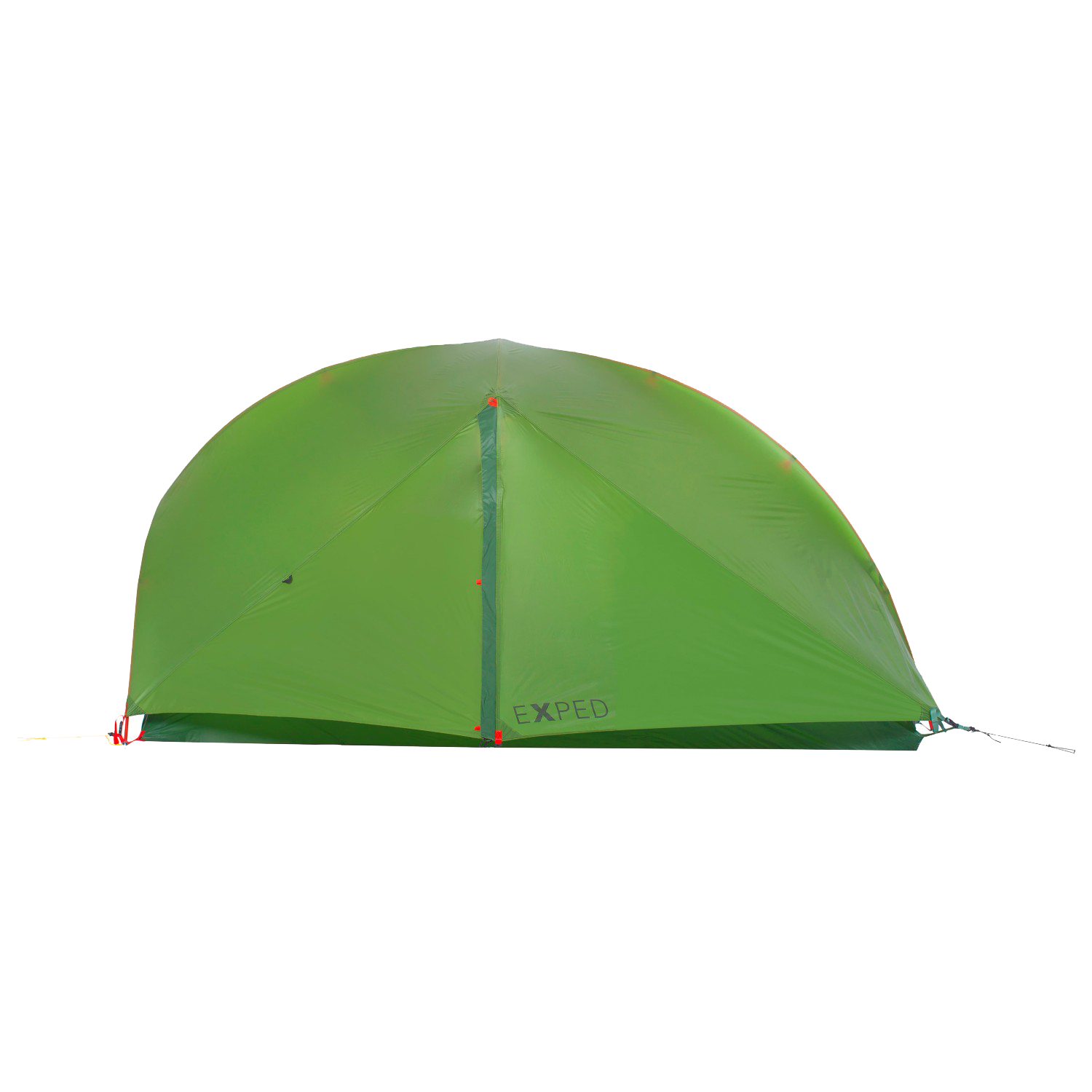
A lightweight three-season tent with plenty of room and impressive protection from the wind
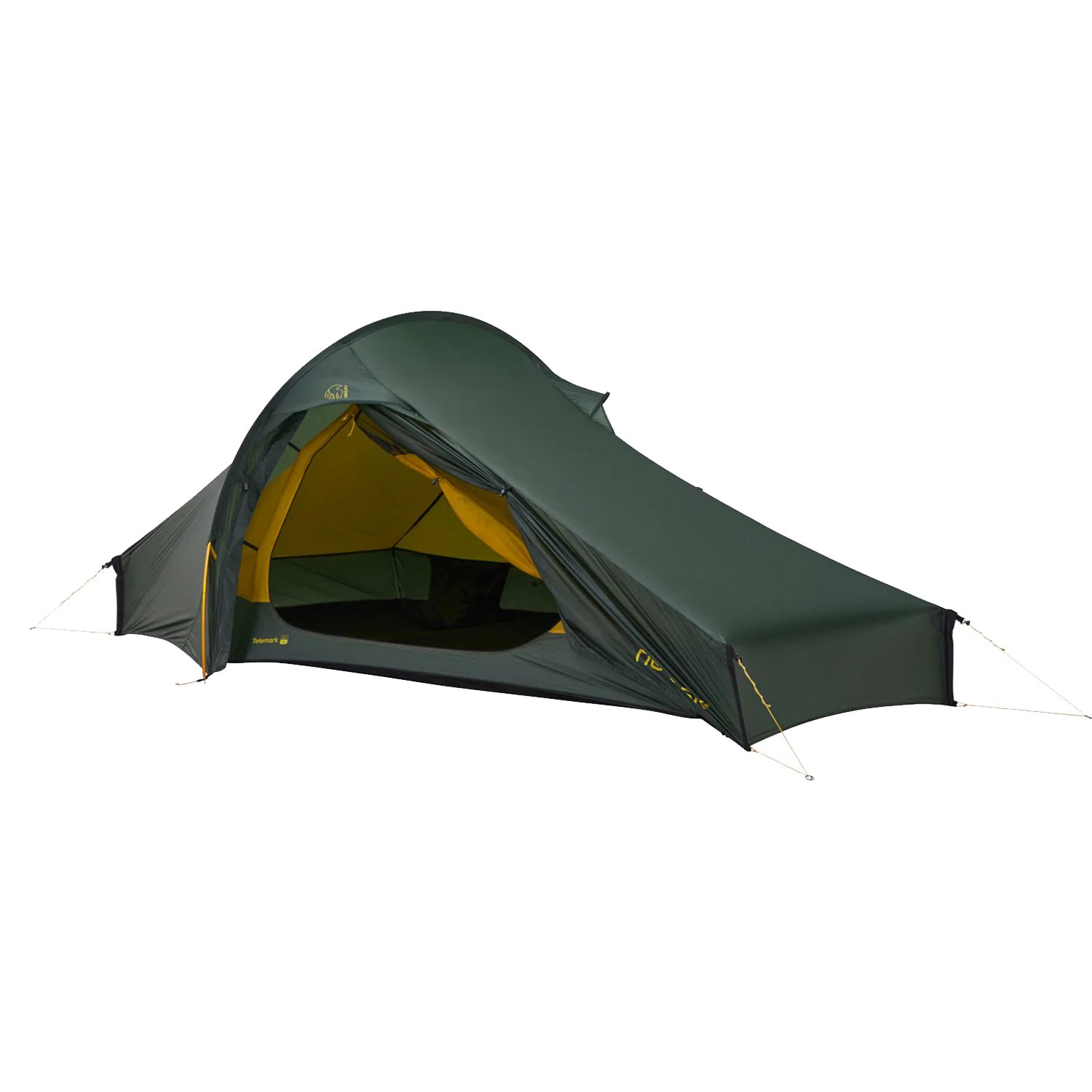
A well-designed and insulating four-season tent that can comfortably hold two people in all manner of conditions
The best two-person tents comparison table
Two-person tent | List price | Weight | Style | Best use |
Sea to Summit Alto TR2 | $499 (US) / £430 (UK) | 2lb 5oz / 1.15kg | Semi-freestanding ultralight backpacking tent | 3 season use: backpacking, car camping |
Decathlon Forclaz MT900 | £209.99 (UK) | 3lb 14oz / 1.75kg | Backpacking tent | 3 season use: backpacking, car camping |
The North Face Trail Lite | $300 (US) / £360 (UK) | 4lb 7oz / 2.01kg | Freestanding dome tent | 3 season use: backpacking, car camping |
Vaude Lizard 1-2P Seamless | £540 (UK) | 2lb 14oz / 1.3kg | Ultralight backpacking tent | 3 season use: backpacking, thru hiking |
REI Co-op Half Dome 2 | $299 (US) | 4lb 13oz / 2.2kg | Spacious backpacking tent | 3-season use: backpacking, car camping |
MSR Hubba Hubba NX | $449.45 (US) / £445 (UK) | 3lb 13oz / 1.7kg | Freestanding lightweight backpacking tent | 3-season use: backpacking, thru hiking, car camping |
Alpkit Jaran 3 Ultralight Backpacking Tent | £279.99 (UK) | 5lb 2oz / 2.36kg | Backpacking tent | 3-season use: backpacking, thru hiking, car camping |
Wild Country Hoolie Compact ETC 2 | £270 (UK) | 6lb 15oz / 3.15kg | Large backpacking tent | 3-season use: backpacking, car camping |
Vango F10 Xenon UL2 | £340 (UK) | 4lb 3oz / 1.9kg | Backpacking tunnel tent | 3-season use: backpacking, thru hiking |
Robens Buck Creek 2 | £374.99 (UK) | 5lb 3oz / 2.35kg | General camping tent | 3-season use: backpacking, car camping |
Terra Nova Laser Compact All-Season 2 | £550 (UK) | 3lb 15oz / 1.8kg | Winter backpacking tent | 4 season use: backpacking, thru hiking, winter walking |
Exped Mira II HL | $449.95 (US) / £725 (UK) | 2lb 9oz / 1.15kg | Dome tent | 3 season use: backpacking, thru-hiking, general use |
Nordisk Telemark 2.2 LW | £720 (UK) | 2lb 4oz / 1.02kg | Tunnel tent | 4 season use: backpacing, winter camping |
The best two-person tents we recommend in 2025
You can trust Advnture
The best two-person tent overall
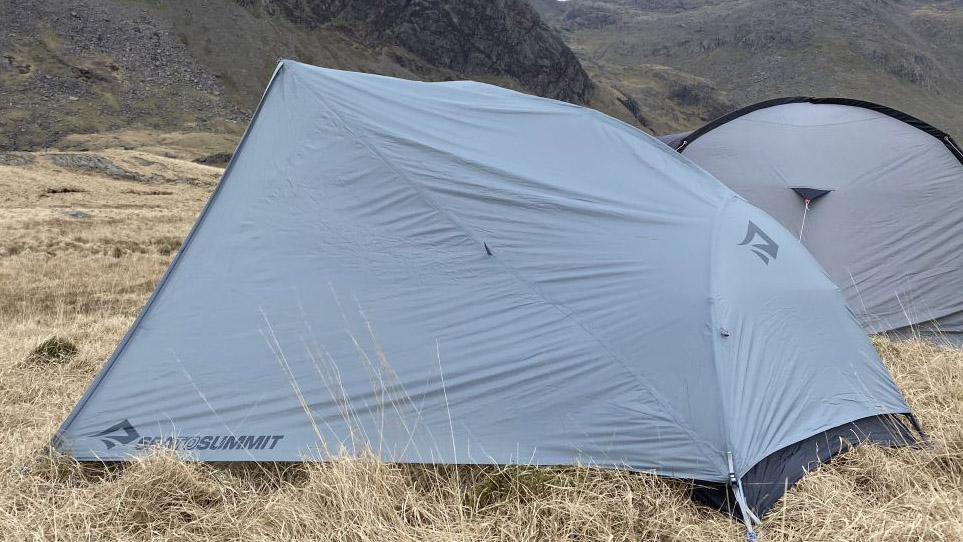
Specifications
Reasons to buy
Reasons to avoid
Sea to Summit's new range of Alto and Telos tents feature patent pending Tension Ridge Architecture, which features a cross bar that cantilevers upwards, creating near vertical walls, a high ceiling and a kind of unrivalled roominess we very much enjoyed on test. This unique and innovative architecture paves the way for myriad other benefits: high doors, large vestibules and good climate control. On test, this all added up to a superbly liveable tent space, especially for a backpacking tent. "The inner boasts a great amount of headroom," said our expert tester Alex Foxfield, "feeling less claustrophobic than most backpacking tents."
Other features include five separate setup options depending on the weather, oversized Apex Vents in the ceiling to combat condensation and an illuminating Lightbar that is used in conjunction with a headlamp. With ultralight DAC poles and lightweight fabrics throughout, the Alto TR2 weighs in at just 1.15kg and this weight can be split into three storage units for the trail. Perfect for wild camping expeditions in the warmer months, this is one of the best 2-person tents out there.
Read out full Sea to Summit Alto TR2 review
The best budget two-person tent
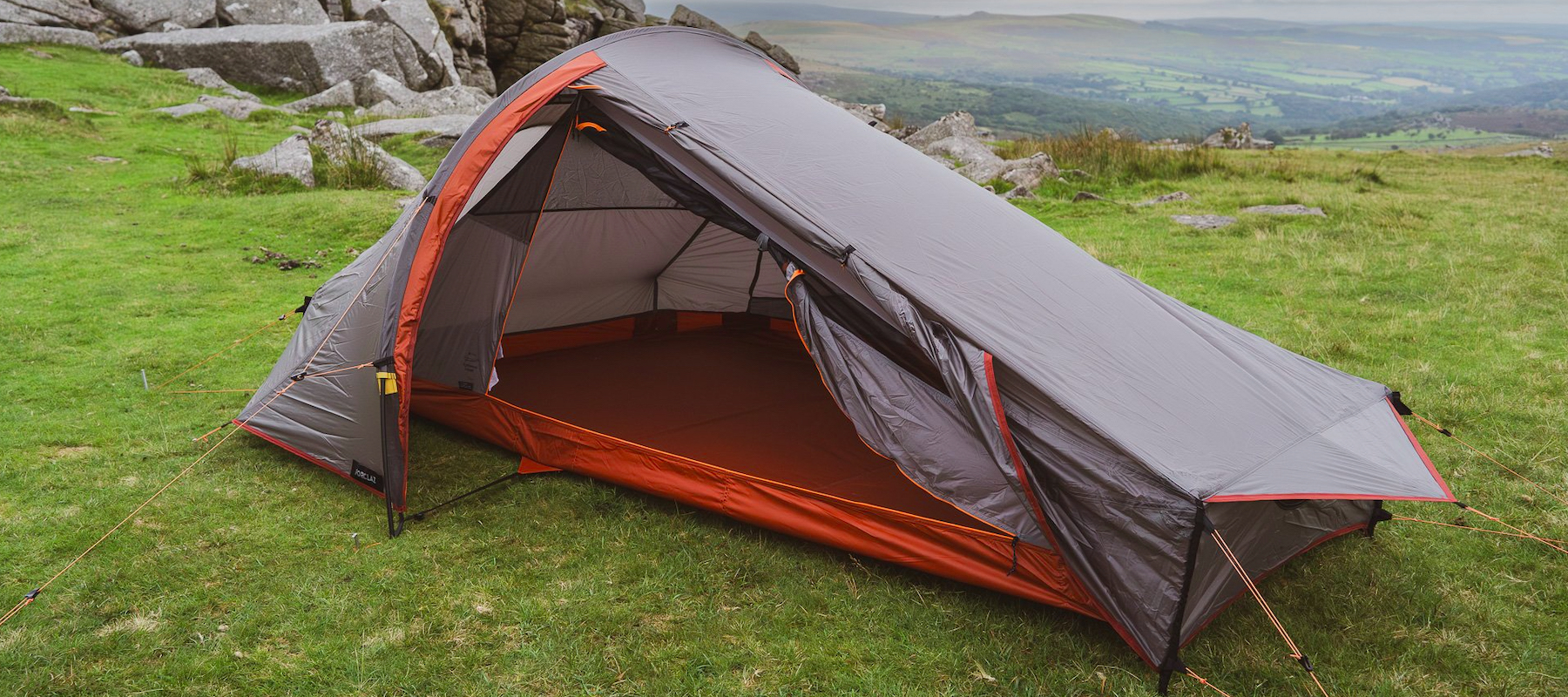
Specifications
Reasons to buy
Reasons to avoid
First things first, the Decathlon Forclaz MT900 Tunnel Tent isn't really a two-person tent – unless you like getting very cozy with the person lying next to you. However, for one person plus gear it's ideal, and incredible value for money.
It's lightweight and ideal for backpacking, squashing down to around the same size as a two-liter soda bottle. It's also quick and easy to put up, even in heavy wind or rain. The central pole can take a bit of wrestling at first, but once you've got the hang of it, it's simple. Even on the first pitch our reviewer Craig Taylor took less than five minutes to get everything up. Exactly what you need in difficult weather conditions.
It's easy to attach and detach guy lines on the Decathlon Forclaz MT900, so you only have to add the ones you need. The doors use plastic hooks rather than strap-and-toggle fittings, which allows you to keep them out of the way when desired.
The main selling point though, is the tent's performance in bad weather, where it easily matches up to much more expensive competitors. Craig found that the Decathlon Forclaz MT900 was drum-tight and stayed strong in very high gusts of wind.
Read our full Decathlon Forclaz MT900 Tunnel Tent review
The best two-person tent for storage options
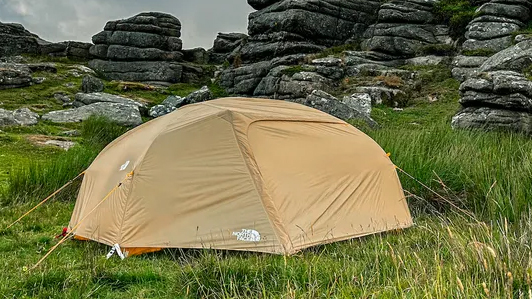
Specifications
Reasons to buy
Reasons to avoid
A lightweight backpacker's tent from powerhouse brand The North Face, the Trail Lite 2 is ingeniously designed dome tent that offers maximum space for two. This is achieved via a crossing pole that's mounted off-center beneath the flysheet and also provides support for the two sizeable storage pockets.
"In my opinion, these considerations make the tent one of the best options out there for duos who hike and camp together," says Craig Taylor, our wild camping expert. Despite its spacious design, it's still compact and light enough for lugging over long distances, such as on a multi-day hike. Two doors provide entry and there are two decent vestibules for all the wet kit. Not only this, it's a doddle to pitch and stands up against challenging conditions too.
So, light, portable and decidedly straightforward to setup, the North Face Trail Lite 2 is a comfortable two-person, three-season shelter that excels in a variety of scenarios.
Read our full The North Face Trail Lite 2-Person Tent review
The best lightweight two-person tent
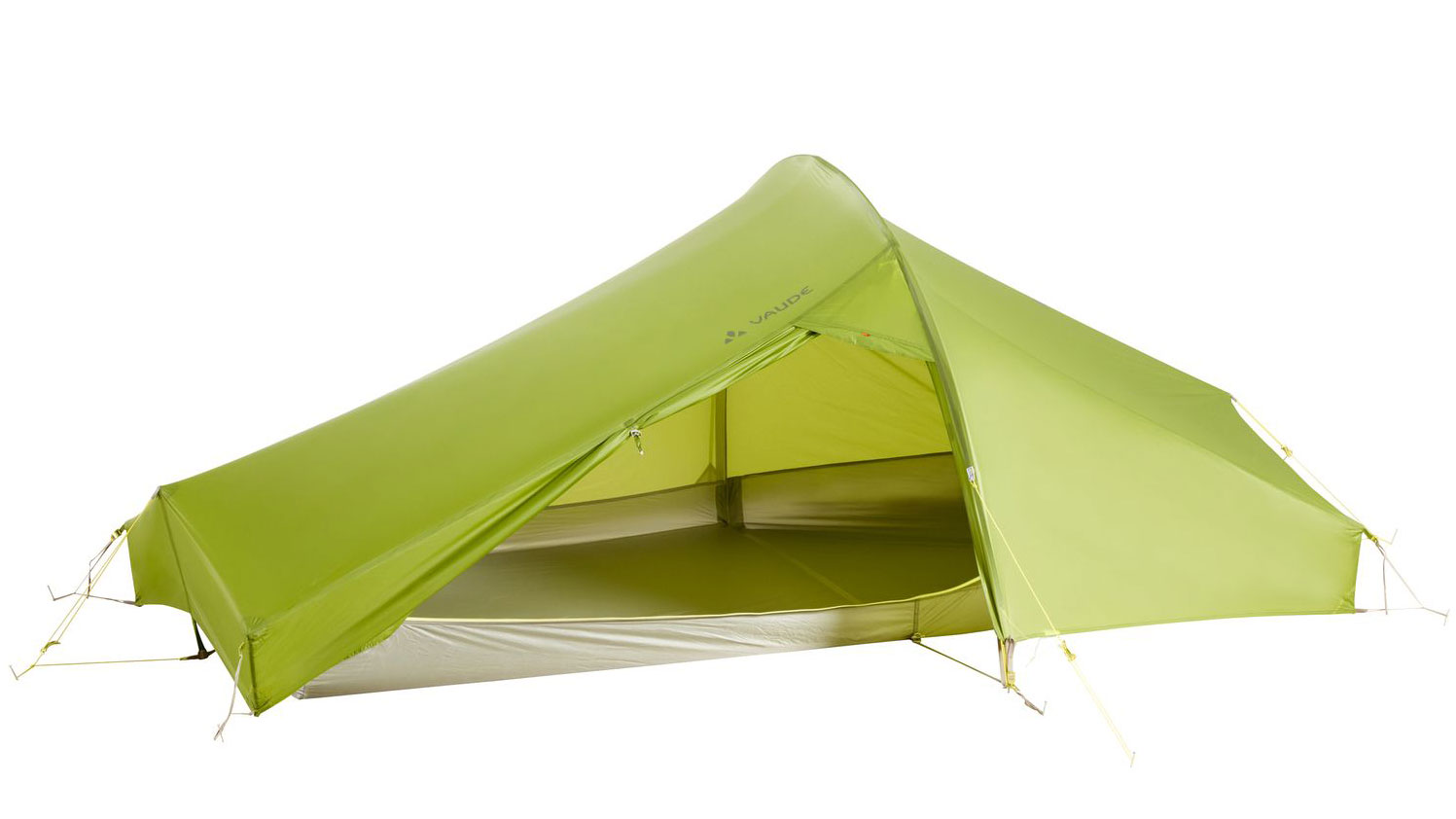
4. Vaude Lizard 1-2P Seamless
Our expert review:
Specifications
Reasons to buy
Reasons to avoid
Described as a one- to two-person tent, we found the Vaude Lizard Seamless 1-2P is palatial for one but snug for two – making it a good option for quick overnighters, but perhaps less ideal for extended trips, unless you’re a couple of adventure racers who are simply too exhausted to care. It is, however, a technically advanced tent that manages to be impressively lightweight for a double-walled tent yet extremely storm-proof too.
There’s only a single entrance, with a modest porch, though we found that the inner tent can be pulled aside to offer a little more room. It's an ideal option for weight-conscious solo adventurers who are likely to encounter variable conditions – though be aware that the lightweight fabrics can tend to flap in the wind, so we recommend earplugs for gusty nights in exposed locations.
Though other tents are cheaper and roomier, few match this one for weight or overall build quality – it is meticulously engineered.
The best two-person tent for space
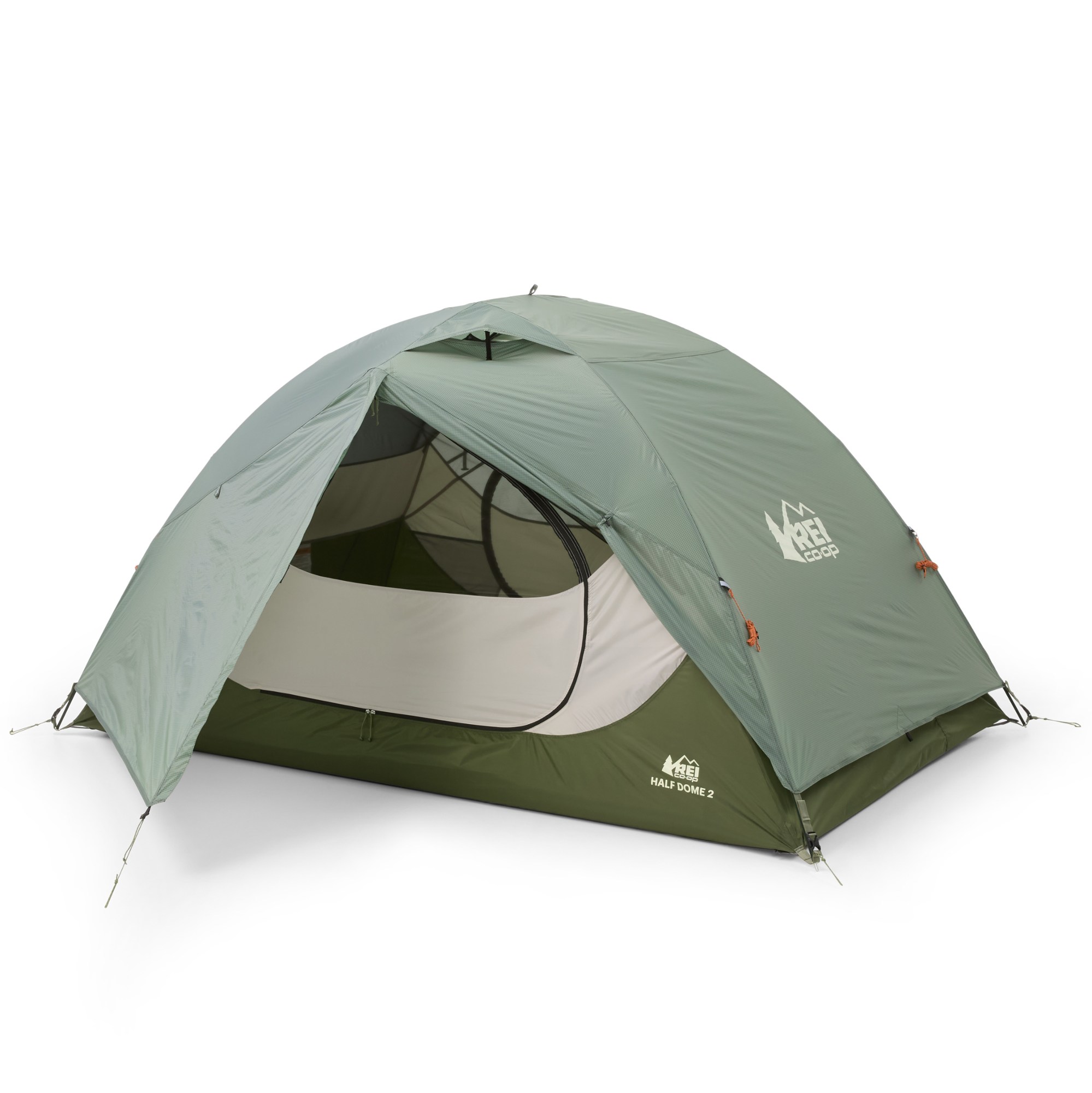
5. REI Co-op Half Dome 2
Specifications
Reasons to buy
Reasons to avoid
The best backpack tent designers worry over the smallest details, and the benefit of their hard work is often found in product attributes you don’t immediately notice, because it’s the things that don’t annoy you. We found that this was the case with the Half Dome 2. Once set up, we enjoyed the large door openings and durable zippers, which translated into easy entry, without snagging mesh or tripping over a door seam that’s too high off the floor.
The Half Dome 2, a pound lighter than the previous model, is filled with the small details that make the difference between frustration and pleasant memories. The proprietary pole architecture delivers vertical walls, while giving us comfortable headroom and floor space. Its a shelter big enough for two adults plus a small child or a trail dog, and ventilation is excellent. Internal organization capacity is good too, with pockets and hanging straps to keep gear readily to hand. In addition to extra storage space under the vestibules, the fly can be rolled up and stowed.
The best two-person tent for easy pitching
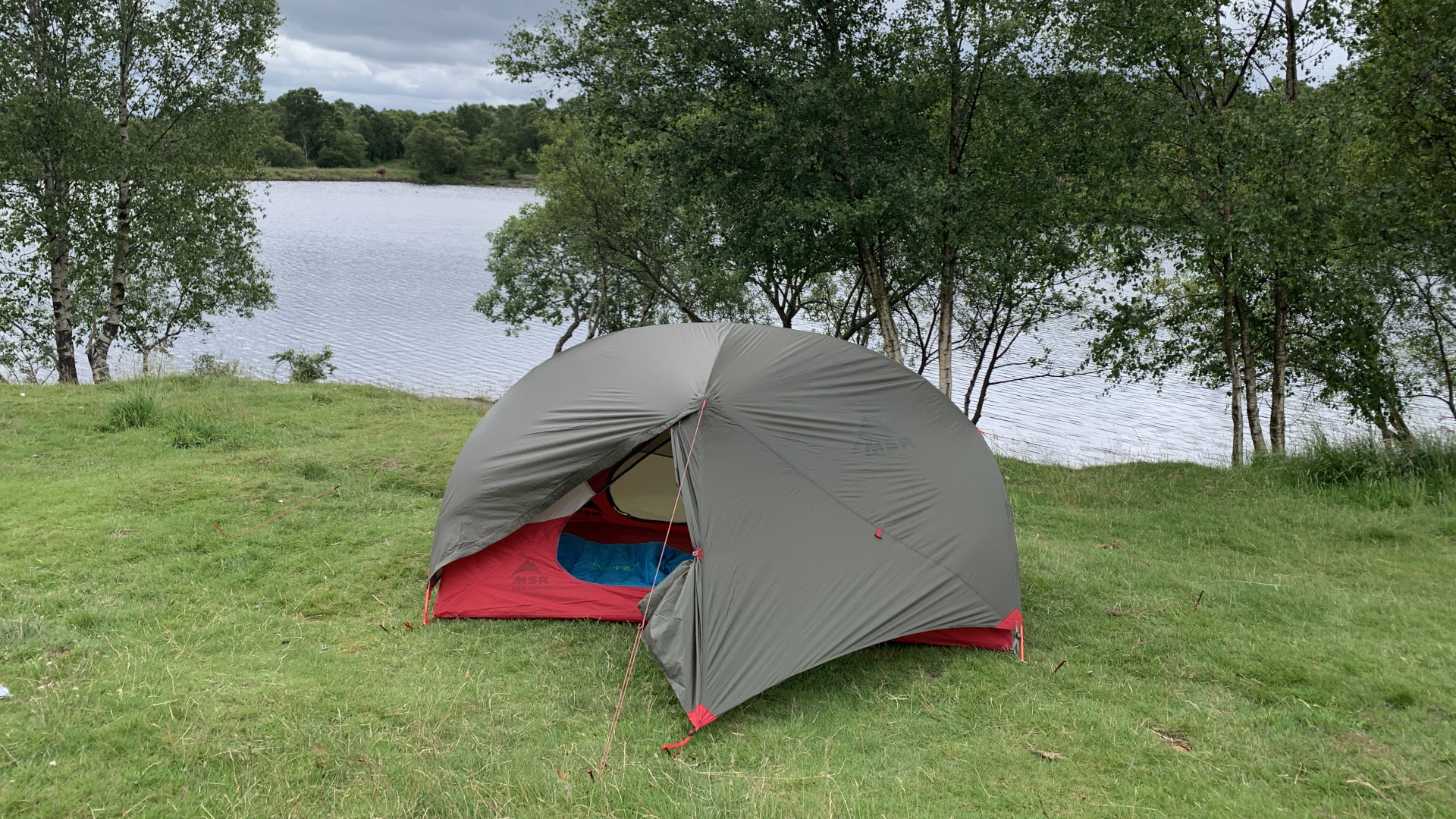
Specifications
Reasons to buy
Reasons to avoid
"A quality tent with solid construction and fabric," according to our camping expert Julia Clarke, this featherweight two-person shelter from MSR's renowned Hubba Hubba series is a backpacker’s dream. We found that, though it easily sleeps two, its low weight and compact unit when packed down makes it comparable to many one-person shelters. It's also very straightforward to erect, with instructions included on the front loading compression sack.
Once we'd set it up, we were pleasantly surprised by how much headroom there is, while there's also plenty of room for trekking packs and kit. Storage wise, both campers are given two pockets for stashing gear, while twin vestibules provide space for dumping wet gear and muddy boots. When the weather is kind, you can pitch inner only and enjoy a spot of stargazing through the mesh upper.
MSR say the shelter is its 'most liveable tent' – and Julia says she "heartily agrees".
Read our full MSR Hubba Hubba NX review
The best two-person tent for backpacking value
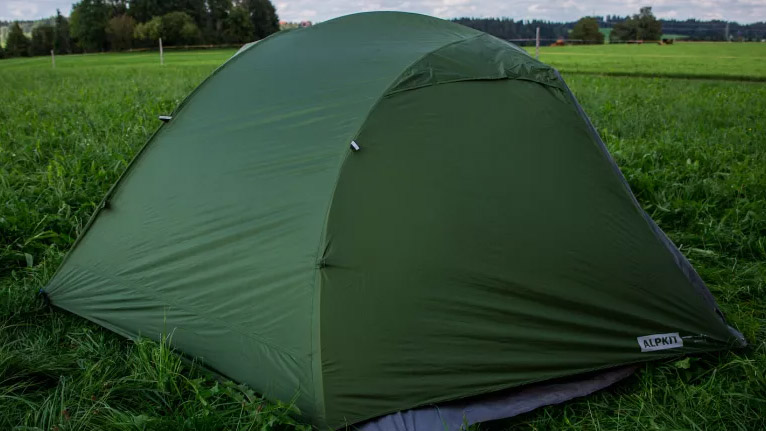
Specifications
Reasons to buy
Reasons to avoid
"From a comfort perspective, the Jaran 3 has been my go-to tent recently," said our wild camping expert Jessie Leong. She was very impressed with this roomy and comfortable offering from Alpkit. It boasts the functionality of twin vestibules, a semi-geodesic form and a sturdy wind-resistant design to make for a solid backpacking shelter for the high places.
It sleeps two in luxury or three at more of a squeeze, while the design is no-nonsense, offering plenty of liveable functionality. There's ample headroom to sit up, which isn't always present in 2-person tents. It's also relatively simple to pitch, though the horizontal supporting crossbar can be a little fiddly first time around.
All in all, this is a shelter that's easy to share with your buddies, or even for a couple of parents with a child.
Read our full Alpkit Jaran 3 ultralight backpacking tent review
The best two-person tent for porch space
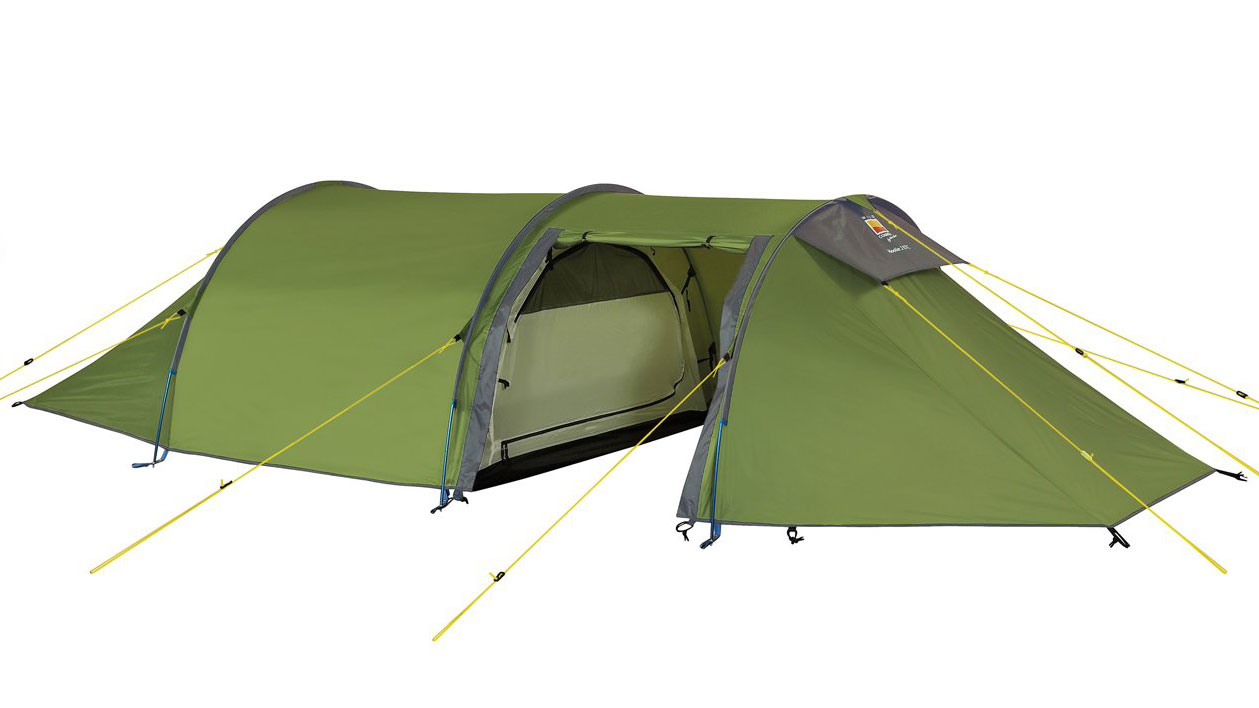
8. Wild Country Hoolie Compact ETC 2
Our expert review:
Specifications
Reasons to buy
Reasons to avoid
Once we had the Hoolie Compact ETC 2 up, the most immediately impressive feature was its cavernous porch. With a total length of over 7ft, it offered us a capacious amount of space for our kit. This makes this tent a popular choice for backpackers on extended trips carrying big, heavily laden packs. We found that the internal sleeping space wasn’t bad either, with generous length plus reasonable width and headroom.
It is not the lightest 2-person tent around, making use of heavier weight polyester fabrics as opposed to lighter nylon or DCF. That does, however, keep the cost down and ensures it is both robust and reliable, with fully taped seams throughout and Superflex alloy poles.
The design pitches all-in-one, while there's only one entrance and it relies on guyline tension for stability, but if securely pitched it is very weatherproof, offering good three-season protection. If there is a drawback to this tent, it’s the relatively modest ventilation. There’s only a half mesh door and two fairly small vents at either end.
The best two-person tent for all-in-one pitching
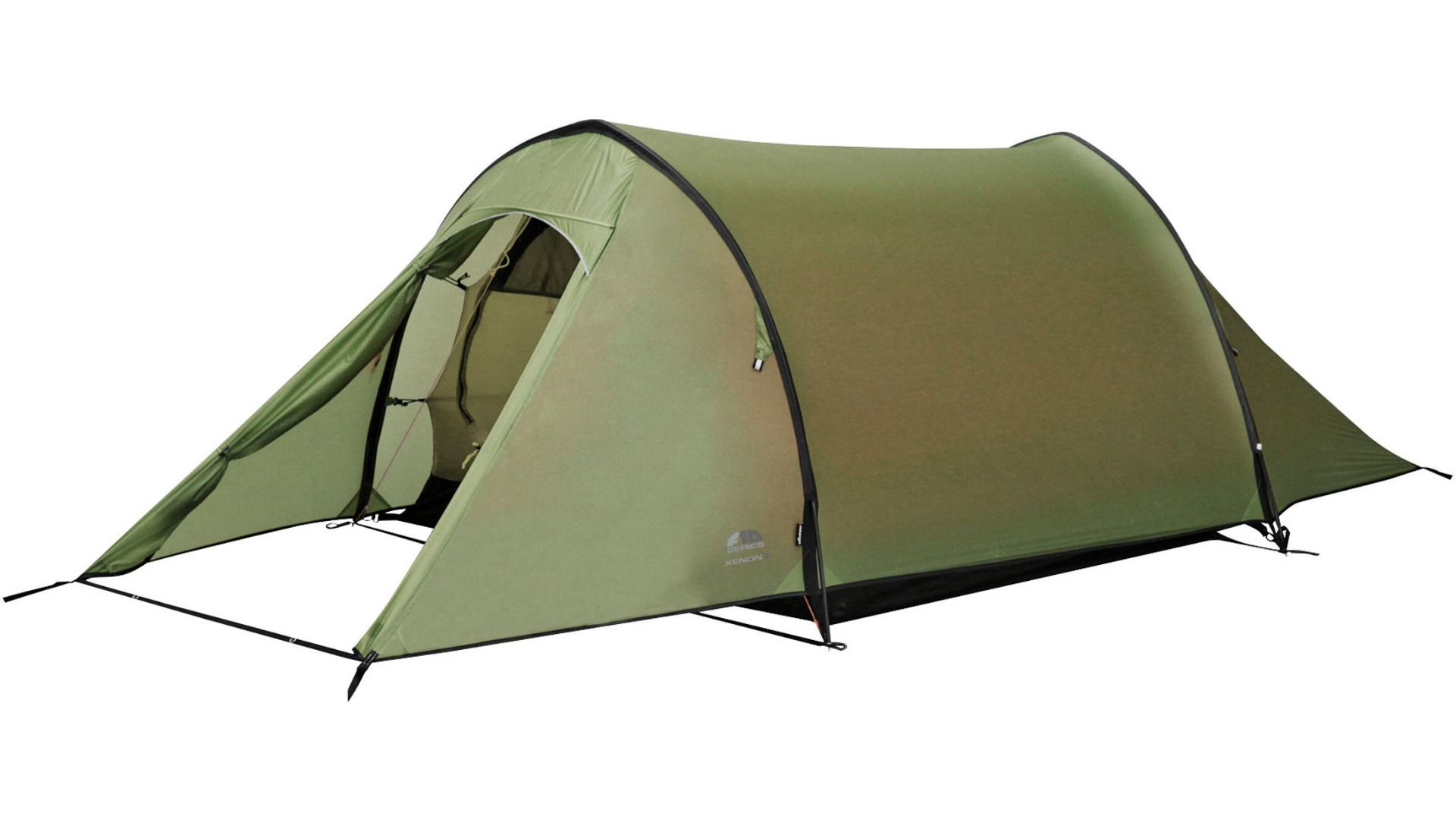
9. Vango F10 Xenon UL 2
Our expert review:
Specifications
Reasons to buy
Reasons to avoid
The Vango F10 Xenon UL2 maximises the advantages of a tunnel tent in a lightweight package. In fact, we found Vango’s clever architecture adds head height without affecting stability, thanks to the tent’s arched poles, which gives steeper walls for better rigidity and improved rain run-off compared to standard hooped poles. Inside, these are braced with the brand’s Tension Band System (TBS), which prevents the poles deforming in high winds.
So, although this isn’t classed as a four-season tent, it's still very weatherproof and stands up well to the rough stuff. Indeed, it prioritises protection at the slight cost of ventilation, and we found that airflow through the tent isn’t as good as many 2-person tents, resulting in condensation in some conditions. However, it pitches all-in-one, which is a practical solution for wetter climates, and with practice goes up very easily.
Although the design offers only one entrance and a single porch, it’s a good size for either cooking in or storing packs and wet gear. It all makes this a robust tent that is well suited to outdoor adventures in unpredictable weather.
The best two-person tent for fast pitching
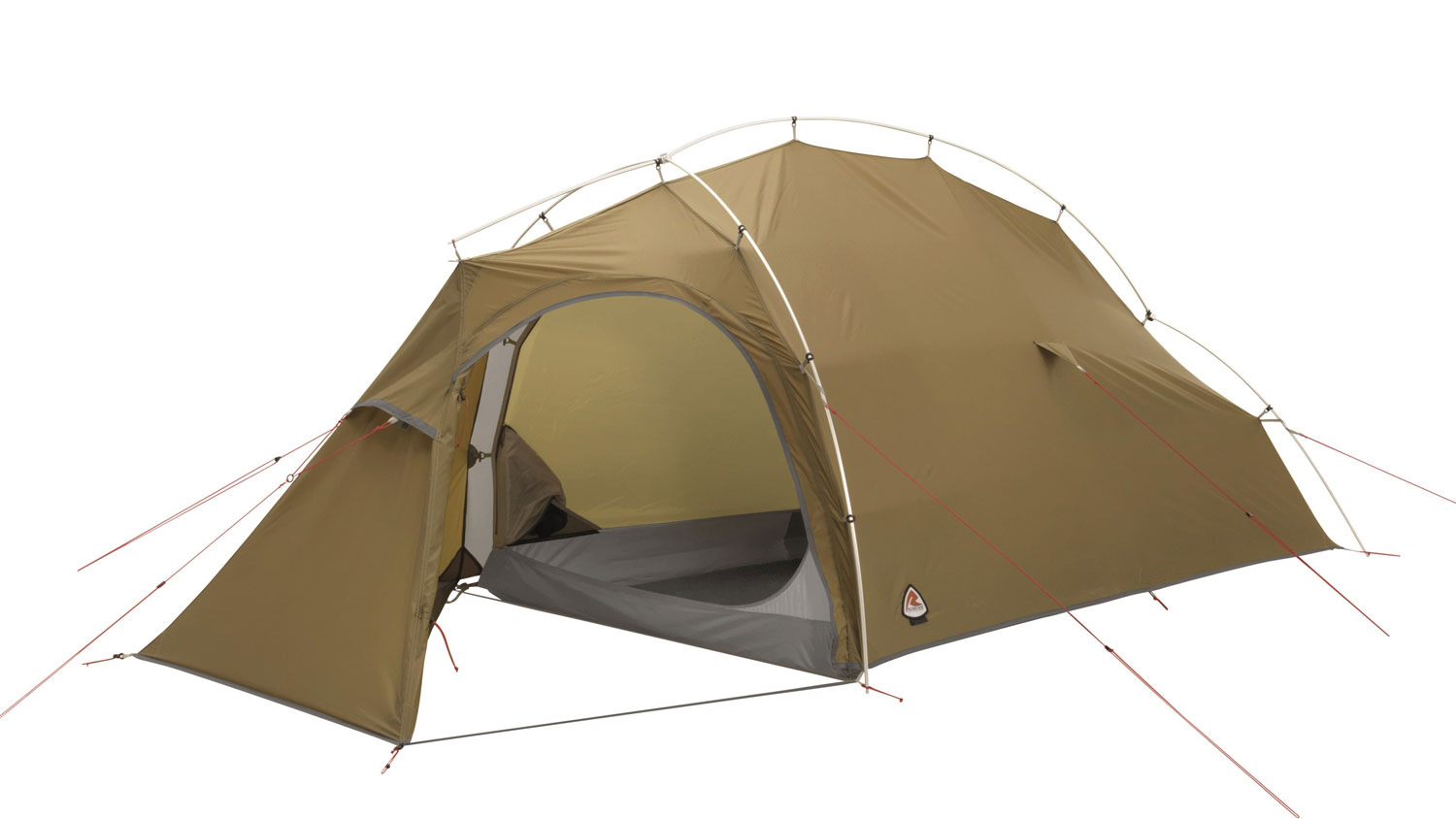
10. Robens Buck Creek 2
Our expert review:
Specifications
Reasons to buy
Reasons to avoid
The Buck Creek 2 is a very practical and liveable shelter. Inside, we found it has an array of little touches that really enhance overall enjoyment. It's robustly made from ripstop polyester, with sealed seams throughout and high-quality 9mm DAC aluminium alloy hubbed poles. This forms a sturdy exoskeleton, to which you simply clip the fabric fly and pre-attached inner, enabling simple, speedy pitching.
When bringing in our wet gear, we valued the porch, which has a partial groundsheet to keep packs and other gear dry, while still providing wet access for muddy boots. The single side doorway has a double zip to crack it open for extra airflow. Other nice touches include guy line retainers to avoid tangles, storage pockets for inner doors and an internal adjustable ridgeline to hang a tent lantern or dry your kit. Inside, the doorway has a mesh panel for ventilation, while the floor space will comfortably accommodate two. At 2.3kg, the weight is middling for a 2-person tent, but it’s still a viable option for backpacking.
The best two-person tent for winter
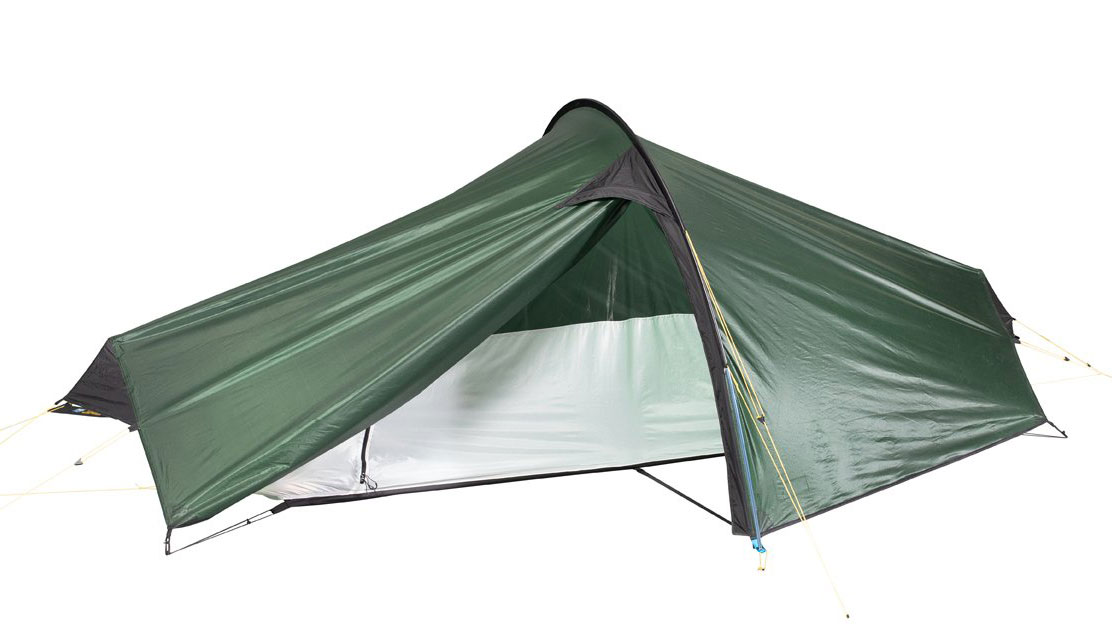
11. Terra Nova Laser Compact All-Season 2
Our expert review:
Specifications
Reasons to buy
Reasons to avoid
Put two iconic tents together and what do you get? The Laser Compact All-Season 2, which Terra Nova claims is the ultimate four-season lightweight 2-person tent. It takes the distinctive low-profile design of the Laser, a favourite amongst lightweight mountain marathoners and adventure racers, and adds super-robust fabrics from the Quasar, the brand’s classic mountain tent (for which the appellation ‘bombproof’ was surely invented). On test, we found the result is a highly resilient and very stable storm-proof shelter that still weighs in at just 1.8kg and packs down to a mere 30 x 16cm.
For a genuine four-season tent that will hold up in the most fearsome winter weather those are impressive specs. But Terra Nova haven’t compromised on features in order to save weight. In fact, they’ve specced up this version for added toughness. As well as fully taped seams throughout, the twin door zips have vent hoods at the top for additional rain protection. Of course, as anyone who is familiar with the Laser design will know, it isn’t the roomiest. Once inside, we found it a little on the small side. As such, this tent is a snug fit for two.
The best two-person tent for windproofing

Specifications
Reasons to buy
Reasons to avoid
The Exped Mira II HL is an ultra-light, dependable tent, designed to keep you warm in biting winds. It’s made from a sturdy combination of 15-denier ripstop nylon and No-See-Um mosquito mesh and protected from the elements by a 10-denier silicone-coated ripstop nylon flysheet.
The dome design is large enough for two campers to enjoy without feeling cramped, and the decent-sized porches enhance the livable feel, according to camping expert Joe Baker.
“Porch space and livability are where the Exped Mira II HL really shines,” reads his review for Advnture.
“Two generously sized vestibules, one for each door, provide more than enough space for gear storage, cooking in a pinch, or just giving you and your camping buddy some elbow room.”
Weighing just 2lbs 9oz (1.15kg), the Mira II HL is an ideal tent for backpackers who don’t want to sacrifice their comfort during three-season trips.
The best two-person tent for waterproofing

Specifications
Reasons to buy
Reasons to avoid
The Nordisk Telemark 2.2 LW tent combines a smart design with minimal weight and excellent durability for three-season use in the wilderness.
At 2lb 4oz (1.02kg), it can be easily packed away and carried around the trails without any discomfort, and protects you from harsh winter conditions with its 15-denier 100% nylon ripstop outer and 2,000mm silicone-coated nylon ripstop flysheet. Its tunnel design is especially stable in high winds and sheds rain effectively in a downpour.
Expert tester Craig Taylor put his Telemark 2.2 LW to the test on plenty of rainy days in the wilderness and was thoroughly impressed throughout.
"Over my months of testing, I’ve put it up against torrential rain and beating wind, and never once has this thing leaked,” said Craig.
“For added security, the groundsheet is made from a PU-coated nylon ripstop material that comes with a hydrostatic head of 8,000mm. This is substantially more waterproof than most other tents of this style on the market, and I found that it kept me fully dry even when camping on waterlogged boggy ground during an impromptu overnighter on Dartmoor in southern England.”
How we test the best two-person tents
At Advnture we endeavor to test every product we feature extensively in the field. That means one of our team of reviewers and writers – all experienced outdoor specialists active across the US, UK, Europe and Australasia – taking it out into the terrain and climatic conditions that it’s designed for. If, for any reason, this isn’t possible, we’ll say so in our buying guides and reviews.
Our reviewers test 2-person tents overnight, sleeping out with an adventure partner in conditions, temperatures and terrain appropriate to the rating assigned to the product by the manufacturers/ brand. They will also carry the tent in a backpacking scenario to test its performance as a shelter for multi day hikes.
For more details, check out how Advnture tests products.
Meet the testers
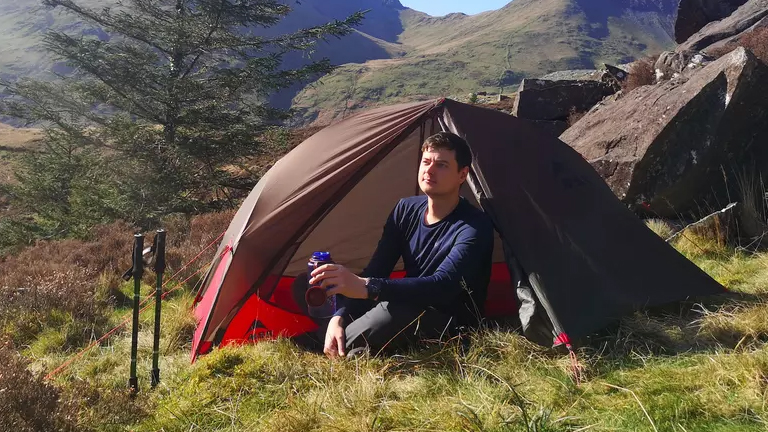
An outdoors writer and editor, Matt Jones has been testing kit in the field for nearly a decade. An avid camper, he knows one or two things about camping equipment, and loves all things adventure, particularly long-distance backpacking, wild camping and climbing mountains – especially in Wales. He’s based in Eryri (Snowdonia), where he can often be found wild camping on remote peaks.

Craig loves nothing more than pitching up in the backcountry, preferably while taking on a long-distance thru-hike. His adventures usually take place in the hills and mountains of Wales but he occasionally gets away to his beloved Alps. As one of our expert campers, Craig revels in testing camping equipment and knows a sturdy shelter from one that will give up the ghost when conditions become challenging.
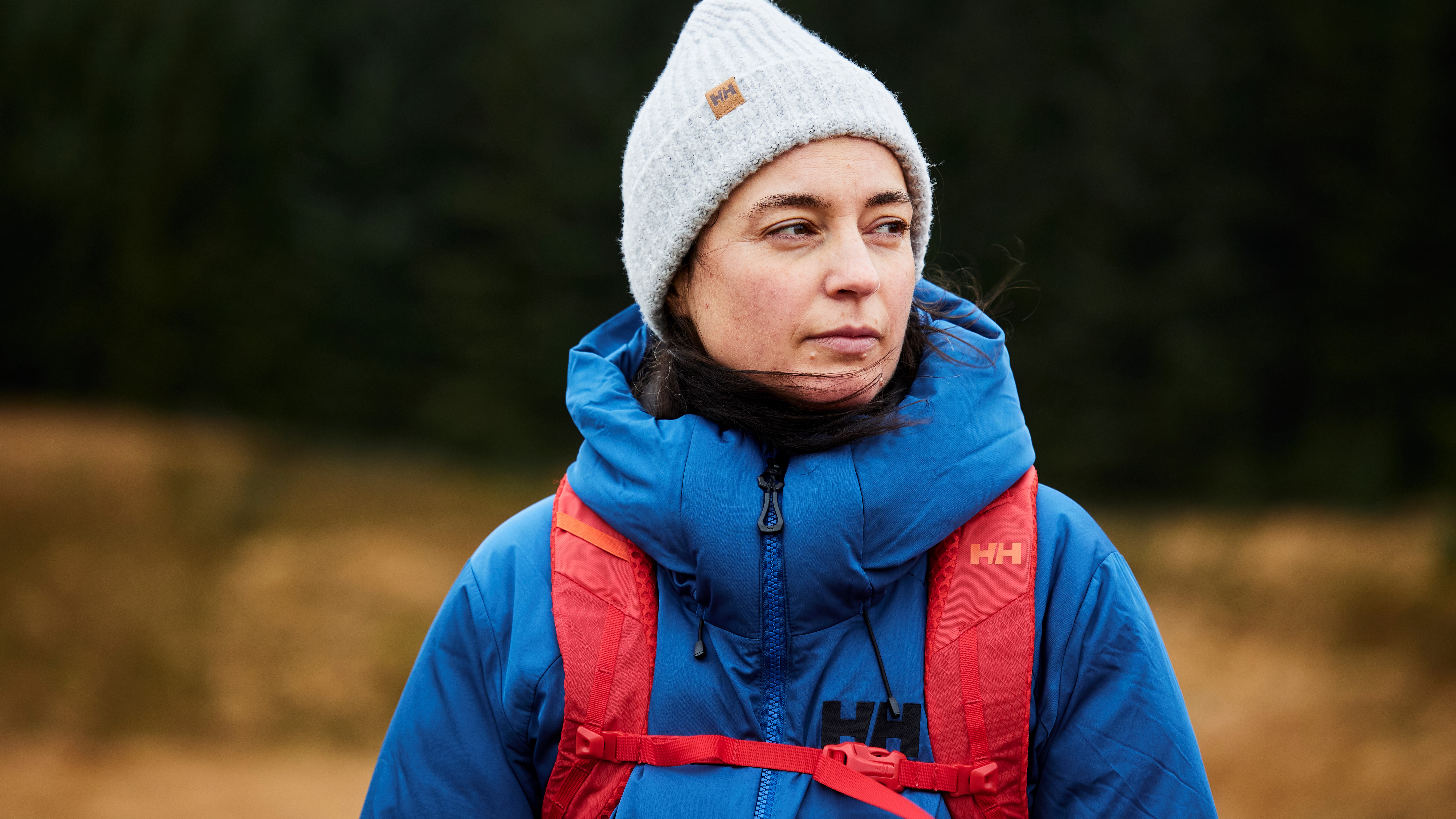
Julia's first big backpacking trip was to Turquoise Lake, just outside of Vail, CO about fifteen years ago. She can still remember every detail of preparing, hiking in and camping in the beautiful bowl of Mount Jackson. These days, she's a veteran and one of Advnture's backpacking experts.
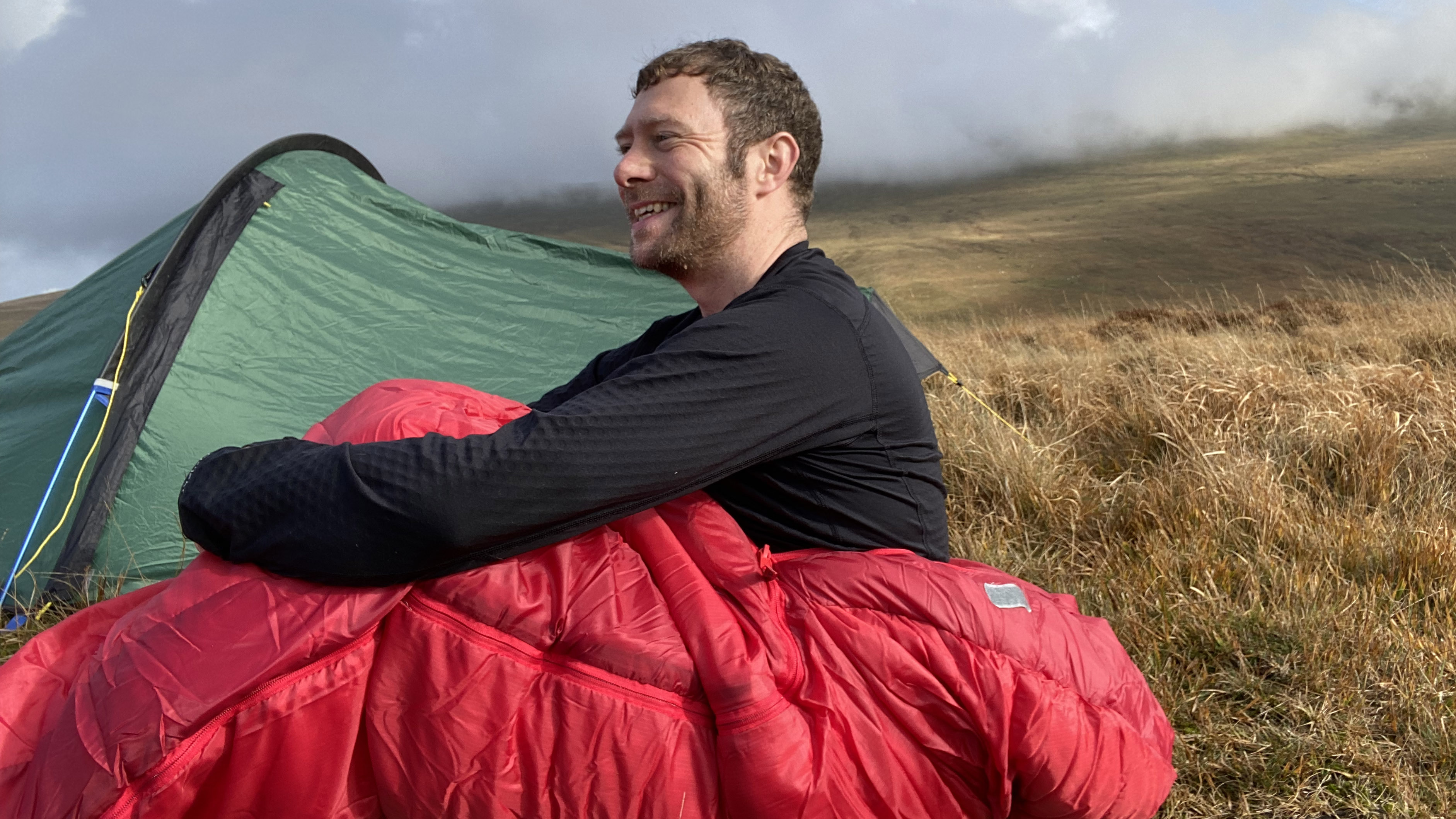
Alex is a freelance adventure writer and qualified Mountain Leader with an insatiable passion for the mountains. Through his hiking and wild camping adventures, Alex aims to inspire others to get outdoors. He spends most of his time either on the hill or daydreaming about being on the hill and is always planning his next backcountry camp.
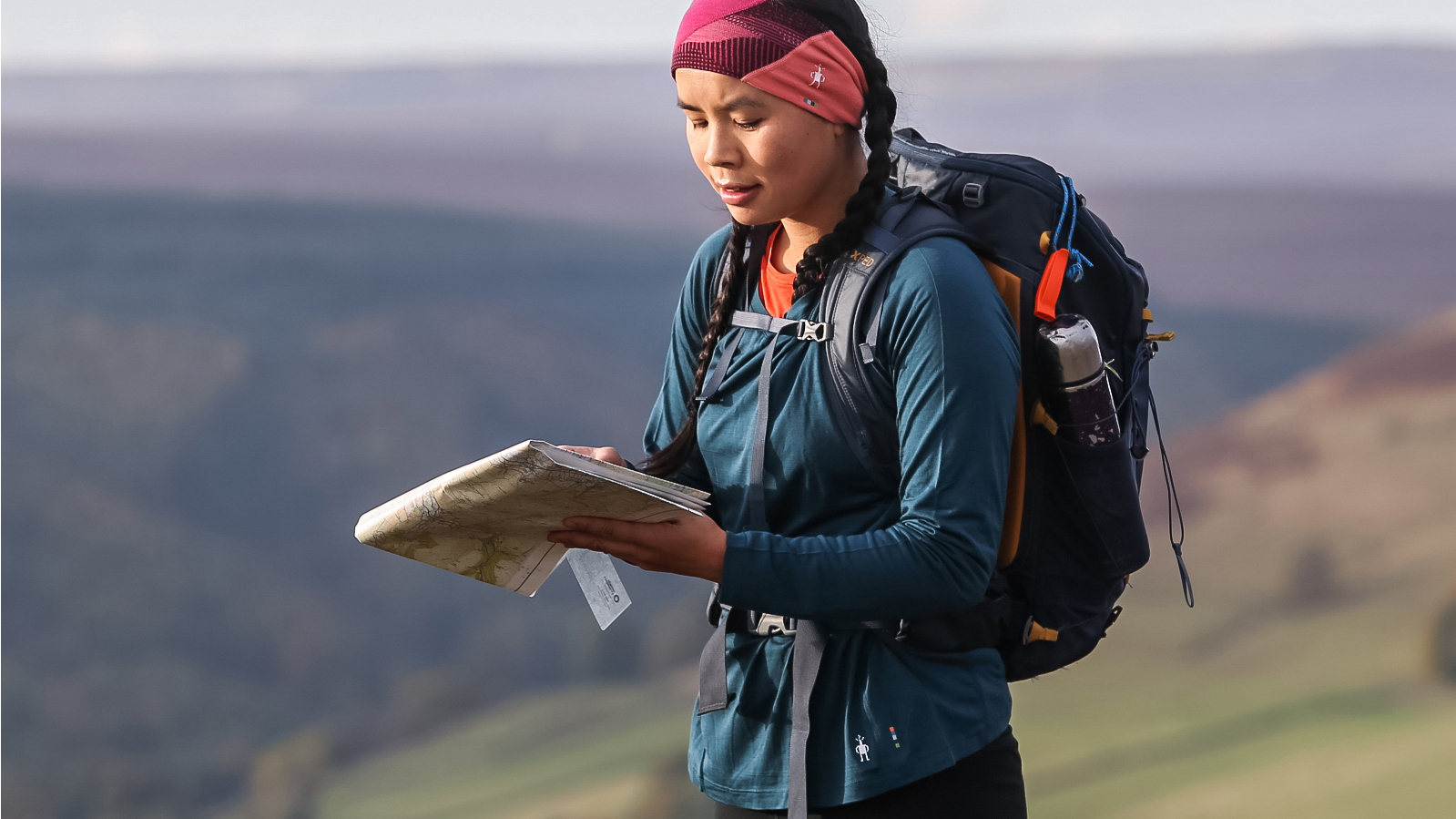
Jessie Leong’s lifelong outdoor odyssey began with Duke of Edinburgh’s Award camps in the Peak District. She's since wild camped across the UK, enjoying multi-day hikes in many of the nation's most mountainous national parks. Jessie’s most recent claim to fame is playing a Miss World contestant in the 2020 feature film Misbehaviour.
How to choose the best two-person tent
When considering how to choose a tent, there are many factors. 2-person tents are among the most popular pieces of backpacking kit around, a mainstay of many adventurers' camping checklists, and there is a bewildering array of models available, scattered across a broad landscape in terms of features, quality, weight and price point. The best 2-person tent for you will depend on what backpacking, canoeing or car camping adventures you have planned.
Before you invest, we've compiled some key considerations, followed by some frequently asked questions to help you choose your ideal shelter.
What are you using your 2-person tent for?
It's fair to say that 2-person tents sit in the sweet spot, meeting the needs of both lightweight backpackers and couples on a car camping trip. That's not to say that every 2-person tent is ideal for both of these things, use is why it's important to consider the purpose of your shelter, before making a purchase.
If you're after a backpacking shelter and you want more space than that provided by a one-person tent, a 2-person tent is ideal. However, you'll want something as light and compact as possible. Hiking up to wild camping spots can often be arduous and having a heavy tent in your backpack may well make it tortuous. Look for a tent that weighs less than 4lb 6oz (2kg).
As well as this, space can be limited in a pack, considering you'll also be carrying a sleeping bag, sleeping pad, food, drink, clothes, cooking equipment and the rest. This is why a tent that packs down small is essential for backpacking use.
These two considerations are less important for a car camping tent and, if car camping is what you're intending, you won't want to be constrained by the needs of backpackers. Look for a tent with a larger footprint and don't worry so much about the weight.
Make sure your tent is good quality
The primary function of a tent is to keep you protected from the elements – mainly wind and rain, but sometimes snow too. This is particularly important if you are intent on going wild camping in the mountains.
On quality tents, the flysheet and groundsheet fabric will have a quoted Hydrostatic Head (HH) rating in terms of 1000s of mm – e.g. 3,000mm – which reflects how much pressure the fabric can withstand before it lets water in. So, a flysheet with a HH of 3,000mm could have a solid column of water 3 metres tall standing on it before it fails.
You can find out more about the right HH rating for your tent here.
But, HH isn’t everything. Good tents also need decent stitching, well sealed seams and quality zips. Ventilation is another important factor – a tent may be fully waterproof, but without adequate moisture management you’ll still get wet from condensation build-up.
In terms of durability, the higher the denier of the face fabric, the more hardwearing it's likely to be. Denier is a unit that represents the thickness of the threads that make up a fabric. Look for tents that have fabrics boasting 75 denier and upwards.
It's always a good idea to read a review or two of the tent you are zoning in on, to check what the experts make of it before committing to a purchase.
How much should I spend on a 2-person tent?
First of all, you should consider whether a 2-person tent matches your ambitions. If you're heading for Glastonbury, you won't want to spend a fortune on something that was designed with the hardy souls of British Antarctic Survey in mind. One of the best pop up tents will be probably be just the ticket (though not the sort of ticket that will get you through the festival gates, sadly).
If long solo trips to the hills and mountains are your thing, then the weight saving you'll make by investing in one of the best one-person tents is more than worth it. However, a 2-person tent may make more sense, especially if you've got buddies you want to bring along.
If you're set on acquiring a quality 2-person tent for backpacking purposes that'll last for many years, you should look to spend at least $150 (£130) and think of it as an investment. Ultralight tents made from premium materials can come with big price tags (much higher than recommended above), as can four-season or expedition tents designed to withstand extremely high winds and massive snow-loading. But unless you’re a committed adventurer, you don’t need to spend an eye-watering sum.
Try to avoid paying the list price where you can – the tents in our roundup often feature in offers, while events like Black Friday represent a great opportunity to bag a bargain shelter.
How important is weight when considering a 2-person tent?
If you’re car camping, these figures are less important – but if you’re backpacking, they’re crucial. Make sure the packed dimensions (i.e. total volume of the tent and poles all bundled up together in their stuff sack) are not too bulky to fit inside your backpack alongside your headlamp and freeze-dried meals.
When adventuring with a partner or adventure buddy, you can usually split the weight of the tent and share it – one person carrying the poles and pegs, the other carting the inner tent and flysheet.
Weight is still a factor of course, especially if you’re walking/running/riding a long distance. Dedicated ultralighters might consider a 2-person tent over 3lb 5oz (1.5kg) as ‘too heavy’, but for most backpackers and wild campers, a 2-person tent up to about 6lb 10oz (3kg) is still reasonably lightweight.
Nylon flysheets offer better strength for their weight, as do carbon fibre poles. Mesh used in the inner is light and cool in warm weather, but can result in a chilly night in cold conditions.
How important is the amount of space in a tent?
Carefully consider the total floor space of the inner, to ensure you’ll have enough room for you, a partner and both of your sleeping pads and gear. Ideally, you should be able to sit up, at least at one end of the tent.
Most tents have a small space outside the inner tent that’s still protected by the flysheet. This porch or vestibule is a great place to store wet kit and muddy boots, and can also act as a sheltered space to cook on a camping stove in poor weather. Make sure the porch is big enough to accommodate gear.
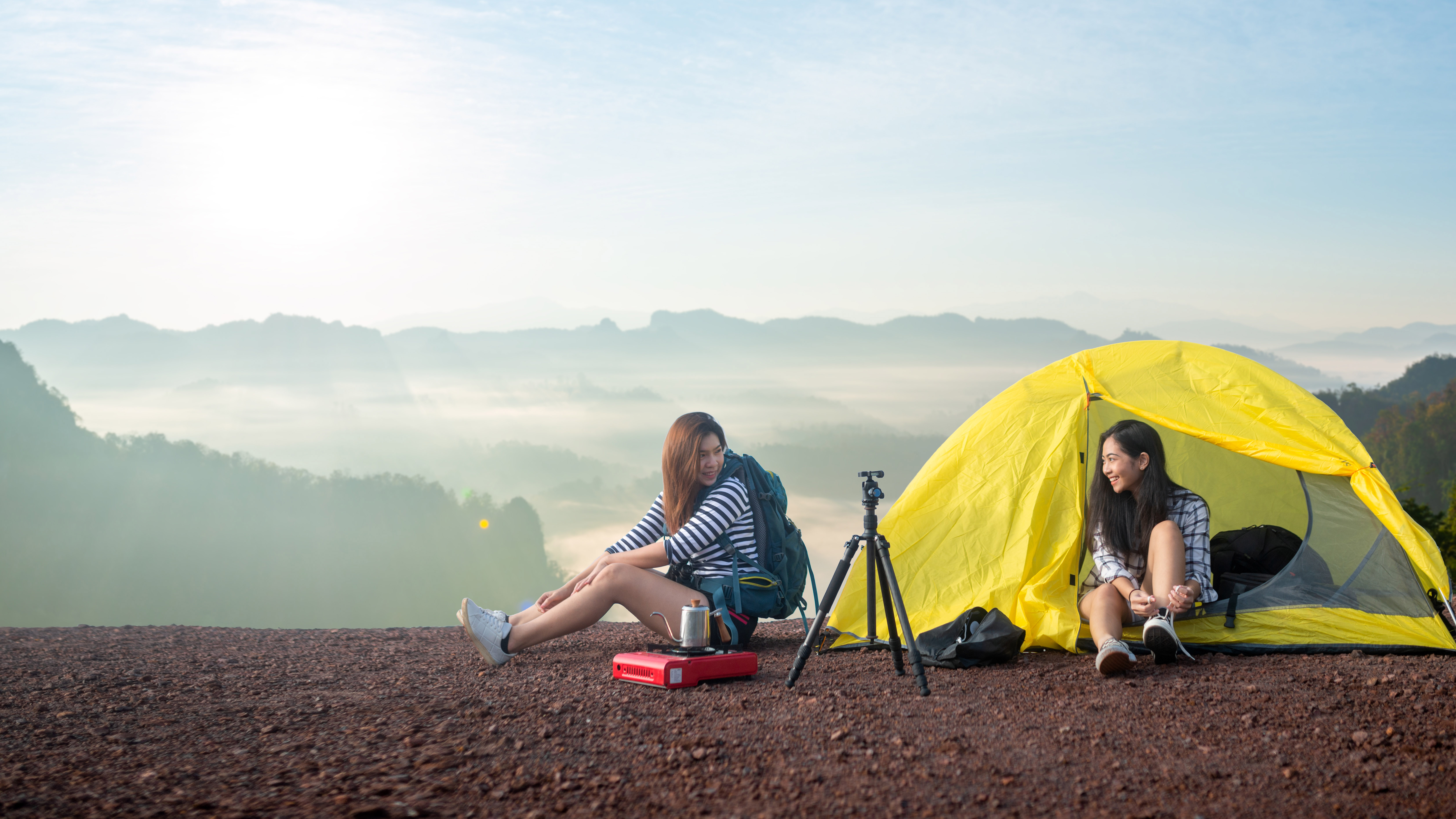
FAQs
Is a small tent warmer than a large tent?
Tents don't provide warmth, they merely trap it. When you go camping, your main heat source at night is yourself and anyone else you're sharing your shelter with. Radiated body heat is trapped within the tent, which is why it ends up warmer inside your tent than outside.
Due to this, a small tent is warmer than a large tent, as there's less air for your body heat to warm up. Also, two people in a 2-person shelter will radiate more heat than one person, so camping with a buddy makes things warmer still. Of course, the best 2-person tents come with ventilation options, which help to keep things cool during balmy summer nights.
How do 2-person tents pitch?
When you're pitching a tent, you need to factor in its design. Tents pitch in one of three ways: inner first, outer first or all-in-one. Some 2-person tent designs are free-standing, meaning that the overall structure is created by the poles alone and does not rely on fabric or guy line tension to keep the tent upright.
A freestanding tent is ideal for pitching on hard ground when it may be difficult or impossible to drive tent pegs or stakes into the ground. It also makes it easier to move the tent around once it is erect if you decide to alter your pitch to find flatter ground, for example.
Provided tent pegs are securely staked, however, non-free-standing designs can be just as stable, and they also have lower profiles, enabling them to shed wind well. As well as pegging points at tent corners, most tents have a series of guy lines to help stabilise the tent in high winds. More guy lines add security and resilience, but also means carrying more pegs.
Is it better to roll or fold a tent?
It's the part of a camping trip that we all hate, packing the tent away. Well, that is unless you're backpacking and there are many more adventurous days on the trails to come.
So, to roll or to fold? That is the question. Well, many experts from tent manufacturers recommend neither, opting instead to stuff. Stuffing is generally better for the tent and is easier to do in a hurry. This makes stuffing the go to for serious backpackers, especially when it's raining.
However, there's also nothing wrong with folding and many prefer rolling the tent when they know it's being put into storage for an extended period.
All the latest inspiration, tips and guides to help you plan your next Advnture!
An outdoors writer and editor, Matt Jones has been testing kit in the field for nearly a decade. Having worked for both the Ramblers and the Scouts, he knows one or two things about walking and camping, and loves all things adventure, particularly long-distance backpacking, wild camping and climbing mountains – especially in Wales. He’s based in Snowdonia and last year thru-hiked the Cambrian Way, which runs for 298 miles from Cardiff to Conwy, with a total ascent of 73,700 feet – that’s nearly 2½ times the height of Everest. Follow Matt on Instagram and Twitter.
- Julia Clarke
- Jessie Leong
- Craig Taylor
- Charlie LyonAdvnture contributor
- Alex Foxfield
